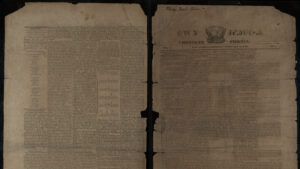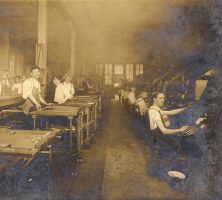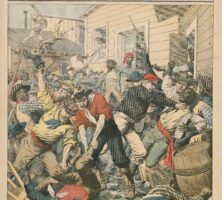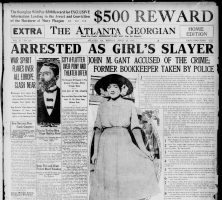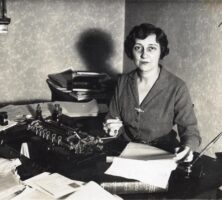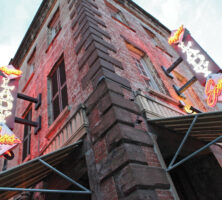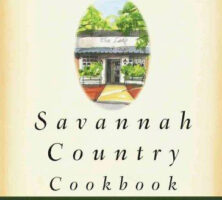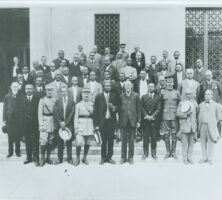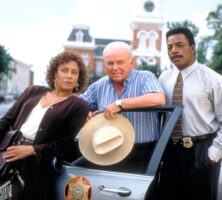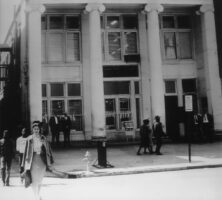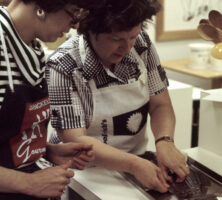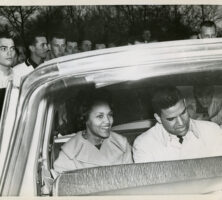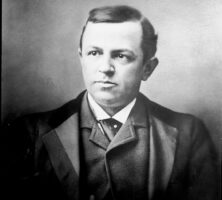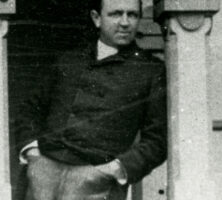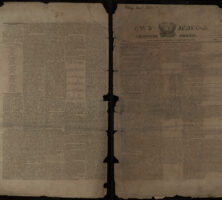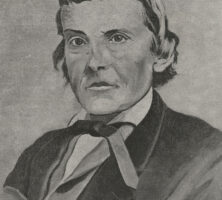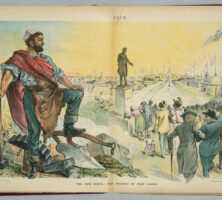The New Georgia Encyclopedia is supported by funding from A More Perfect Union, a special initiative of the National Endowment for the Humanities.
Famed newspaper magnate William Randolph Hearst purchased the Atlanta Georgian in 1912, expanding his media empire into the South for the first time. Hearst brought in staff from his other newspaper holdings across the country to populate the Atlanta newsroom and, by 1914, it had surpassed the Atlanta Constitution in circulation, making it the second most popular newspaper in Atlanta for a brief period.
Courtesy of Special Collections & Archives, Georgia State University Library, Edmond Torbush Papers, Southern Labor Archives.
The New Georgia Encyclopedia does not hold the copyright for this media resource and can neither grant nor deny permission to republish or reproduce the image online or in print. Requests for permission to publish or reproduce the resource should be submitted to Special Collections and Archives at Georgia State University.
The race massacre of 1906 made international headlines and threatened Atlanta's image as a thriving New South city. The incident, sparked by sensationalized accounts of Black violence, lasted for two nights and resulted in dozens of Black deaths. It was reported in the October 7, 1906, issue of the French publication Le Petit Journal. The original caption translates as "Lynchings in the United States."
The New Georgia Encyclopedia does not hold the copyright for this media resource and can neither grant nor deny permission to republish or reproduce the image online or in print. All requests for permission to publish or reproduce the resource must be submitted to the rights holder.
The Atlanta Georgian, which circulated daily from 1906 to 1939, was the first newspaper in the South owned by William Randolph Hearst and the most prominent example of yellow journalism in Georgia. Under his ownership, the paper expanded circulation to eight or more editions a day and printed increasingly scandalous headlines and illustrations that dramatized local crimes in Atlanta.
Courtesy of Digital Library of Georgia.
The New Georgia Encyclopedia does not hold the copyright for this media resource and can neither grant nor deny permission to republish or reproduce the image online or in print. Requests for permission to publish or reproduce the resource may need to be submitted to the Digital Library of Georgia.
Mildred Seydell was one of the first women in Georgia to work as a professional journalist. A native of Atlanta, Seydell began her career as a correspondent for a West Virginia newspaper before being hired in 1924 as a society-page writer for the Atlanta Georgian.
Courtesy of Stuart A. Rose Manuscript, Archives, and Rare Book Library, Emory University, Mildred Seydell Papers.
The New Georgia Encyclopedia does not hold the copyright for this media resource and can neither grant nor deny permission to republish or reproduce the image online or in print. For more information about this resource, contact the Stuart A. Rose Manuscript, Archives, and Rare Book Library at Emory University.
Mirabeau B. Lamar established the Columbus Enquirer as a four-page weekly newspaper in 1828, the same year the Georgia legislature incorporated the city of Columbus. The issue seen here dates from May of that year.
Courtesy of Digital Library of Georgia.
The New Georgia Encyclopedia does not hold the copyright for this media resource and can neither grant nor deny permission to republish or reproduce the image online or in print. Requests for permission to publish or reproduce the resource may need to be submitted to the Digital Library of Georgia.
Julian Harris, editor and co-owner, with his wife, Julia, of the Columbus Enquirer-Sun, reads mail at his desk in the late 1920s. Harris, the son of Georgia folklorist Joel Chandler Harris, and his wife jointly won a Pulitzer Prize in 1926 for their reporting in the Enquirer-Sun on state officials with ties to the Ku Klux Klan.
Courtesy of Georgia Archives, Vanishing Georgia, #
ful0939-85.
The New Georgia Encyclopedia does not hold the copyright for this media resource and can neither grant nor deny permission to republish or reproduce the image online or in print. Requests for permission to publish or reproduce the resource should be submitted to the Georgia Archives.
The Ledger-Enquirer Building, seen here in the 1930s, was designed by local architecture firm Smith & Biggers. The building was purchased by Columbus State University in 2014.
Courtesy of Atlanta Journal-Constitution.
The New Georgia Encyclopedia does not hold the copyright for this media resource and can neither grant nor deny permission to republish or reproduce the image online or in print. All requests for permission to publish or reproduce the resource must be submitted to the Atlanta Journal-Constitution.
The Walking Dead televsion series is adaptated from a comic book created in 2003 by Robert Kirkman and Tony Moore. The series premiered on the AMC cable network on October 31, 2010.
The New Georgia Encyclopedia does not hold the copyright for this media resource and can neither grant nor deny permission to republish or reproduce the image online or in print. All requests for permission to publish or reproduce the resource must be submitted to the rights holder.
The Walking Dead comic book series, created by writer Robert Kirkman and artist Tony Moore, was first published in 2003. The popularity of the comic increased dramatically with the premiere of The Walking Dead television series in 2010, and two years later it had become the best-selling independent comic book series.
The New Georgia Encyclopedia does not hold the copyright for this media resource and can neither grant nor deny permission to republish or reproduce the image online or in print. All requests for permission to publish or reproduce the resource must be submitted to the rights holder.
The Georgia Radio Hall of Fame was founded in 2007 to honor the work of Georgia's radio professionals and to preserve the history of Georgia radio.
Courtesy of the Georgia Radio Hall of Fame
The New Georgia Encyclopedia does not hold the copyright for this media resource and can neither grant nor deny permission to republish or reproduce the image online or in print. All requests for permission to publish or reproduce the resource must be submitted to the rights holder.
Elmo Ellis's 1950s campaign, "Removing the Rust from Radio," encouraged the revitalization of radio in the wake of television's growing popularity. Ellis was honored with a Peabody Award and was inducted into the Georgia Association of Broadcasters Hall of Fame.
Courtesy of History of WSB Radio
The New Georgia Encyclopedia does not hold the copyright for this media resource and can neither grant nor deny permission to republish or reproduce the image online or in print. All requests for permission to publish or reproduce the resource must be submitted to the rights holder.
Sam Hale, cofounder of the Georgia Radio Hall of Fame, welcomes guests to the organization's inaugural induction awards ceremony, held in Atlanta in 2007.
Courtesy of the Georgia Radio Hall of Fame
The New Georgia Encyclopedia does not hold the copyright for this media resource and can neither grant nor deny permission to republish or reproduce the image online or in print. All requests for permission to publish or reproduce the resource must be submitted to the rights holder.
John Long (left), cofounder of the Georgia Radio Hall of Fame, accepts a commendation from Georgia governor Sonny Perdue (not pictured) at the organization's inaugural induction awards ceremony, held in Atlanta in 2007.
Courtesy of Georgia Radio Hall of Fame
The New Georgia Encyclopedia does not hold the copyright for this media resource and can neither grant nor deny permission to republish or reproduce the image online or in print. All requests for permission to publish or reproduce the resource must be submitted to the rights holder.
DeForest Kelley, an Atlanta native, was an actor best known for playing the role of Dr. Leonard "Bones" McCoy in the television series Star Trek and feature films.
From the collections of the Margaret Herrick Library
The New Georgia Encyclopedia does not hold the copyright for this media resource and can neither grant nor deny permission to republish or reproduce the image online or in print. All requests for permission to publish or reproduce the resource must be submitted to the rights holder.
Atlanta Constitution journalists and Pulitzer Prize winners Gene Patterson (left), Ralph McGill (center), and Jack Nelson are pictured circa 1967, the year Patterson received the award.
Courtesy of Atlanta Journal-Constitution.
The New Georgia Encyclopedia does not hold the copyright for this media resource and can neither grant nor deny permission to republish or reproduce the image online or in print. All requests for permission to publish or reproduce the resource must be submitted to the Atlanta Journal-Constitution.
Gene Patterson, pictured in 2002, was an influential editor of the Atlanta Constitution during the civil rights movement and later founded Georgia Trend magazine.
Courtesy of Atlanta Journal-Constitution.
The New Georgia Encyclopedia does not hold the copyright for this media resource and can neither grant nor deny permission to republish or reproduce the image online or in print. All requests for permission to publish or reproduce the resource must be submitted to the Atlanta Journal-Constitution.
Albany native Paula Deen, a well-known restaurateur and television personality, is the host of Paula's Home Cooking, which premiered on the Food Network in 2002. Her restaurant, The Lady and Sons, is a popular tourist destination in Savannah.
Photograph from Paula Deen
The New Georgia Encyclopedia does not hold the copyright for this media resource and can neither grant nor deny permission to republish or reproduce the image online or in print. All requests for permission to publish or reproduce the resource must be submitted to the rights holder.
Paula Deen's iconic restaurant The Lady and Sons opened in downtown Savannah in 1996 and features such southern favorites as fried green tomatoes and hoecakes. In 2004 she opened another restaurant in Savannah, Uncle Bubba's Oyster House, with her younger brother.
Image from Steven Miller
The New Georgia Encyclopedia does not hold the copyright for this media resource and can neither grant nor deny permission to republish or reproduce the image online or in print. All requests for permission to publish or reproduce the resource must be submitted to the rights holder.
Paula Deen published her first cookbook, The Lady and Sons: Savannah Country Cookbook, in 1997, one year after opening The Lady and Sons restaurant in Savannah. She became well known outside the South by selling the cookbook on QVC, a home-shopping television network.
The New Georgia Encyclopedia does not hold the copyright for this media resource and can neither grant nor deny permission to republish or reproduce the image online or in print. All requests for permission to publish or reproduce the resource must be submitted to the rights holder.
Atlanta-based Alton Brown, the host and producer of the Food Network's television series Good Eats, has written numerous books about cooking, including I'm Just Here for the Food (2002) and Good Eats: The Early Years (2009).
The New Georgia Encyclopedia does not hold the copyright for this media resource and can neither grant nor deny permission to republish or reproduce the image online or in print. All requests for permission to publish or reproduce the resource must be submitted to the rights holder.
Alton Brown, raised in White County, is a food television personality and producer based in Atlanta. His cooking show, Good Eats, premiered in 1999 and received a George Foster Peabody Award from the University of Georgia in 2007.
Photograph from UGA Today
The New Georgia Encyclopedia does not hold the copyright for this media resource and can neither grant nor deny permission to republish or reproduce the image online or in print. All requests for permission to publish or reproduce the resource must be submitted to the rights holder.
J. Richardson Jones, an Atlanta native, was a journalist, filmmaker, and entertainer whose work both challenged segregation and celebrated African American life during the Jim Crow era.
Courtesy of Atlanta History Center.
The New Georgia Encyclopedia does not hold the copyright for this media resource and can neither grant nor deny permission to republish or reproduce the image online or in print. Requests for permission to publish or reproduce the resource should be submitted to the Atlanta History Center.
J. Richardson Jones, kneeling right, is pictured on a handbill from the 1925 production of his play Thy Will Be Done at the Strand Theatre in Jacksonville, Florida. The play was later produced in July 1926 at the Douglass Theatre in Macon. An Atlanta native, Jones began his career in vaudeville and radio, and later became a journalist for the Atlanta Daily World.
Courtesy of Middle Georgia Archives, Washington Memorial Library.
The New Georgia Encyclopedia does not hold the copyright for this media resource and can neither grant nor deny permission to republish or reproduce the image online or in print. Requests for permission to publish or reproduce the resource may need to be submitted to the Middle Georgia Archives at Washington Memorial Library.
A poster advertises Parade of Negro Progress, a Technicolor feature film based on a short newsreel produced in 1939 by J. Richardson Jones as an advertisement for the Atlanta Life Insurance Company. The feature played in all-Black theaters around the South in 1941-42.
Courtesy of Archives Division, Auburn Avenue Research Library on African American Culture and History, Atlanta-Fulton Public Library System
The New Georgia Encyclopedia does not hold the copyright for this media resource and can neither grant nor deny permission to republish or reproduce the image online or in print. All requests for permission to publish or reproduce the resource must be submitted to the rights holder.
Tyler Perry, a native of New Orleans, Louisiana, is an Atlanta-based filmmaker, playwright, and performer. His Tyler Perry Studios, established in Atlanta in 2008, is the first major film studio in the nation to be solely owned by an African American.
Photograph from AMFM STUDIOS LLC
The New Georgia Encyclopedia does not hold the copyright for this media resource and can neither grant nor deny permission to republish or reproduce the image online or in print. All requests for permission to publish or reproduce the resource must be submitted to the rights holder.
Journalist Deborah Norville, pictured in 2007, is a native of Dalton and a graduate of the University of Georgia. She became host of the news and entertainment television program Inside Edition in 1995.
Courtesy of Atlanta Journal-Constitution.
The New Georgia Encyclopedia does not hold the copyright for this media resource and can neither grant nor deny permission to republish or reproduce the image online or in print. All requests for permission to publish or reproduce the resource must be submitted to the Atlanta Journal-Constitution.
Deborah Norville is pictured in 1997 at a signing for her self-help book Back on Track. A Georgia native, Norville is the host of the television news program Inside Edition and the author of several books.
Courtesy of Atlanta Journal-Constitution.
The New Georgia Encyclopedia does not hold the copyright for this media resource and can neither grant nor deny permission to republish or reproduce the image online or in print. All requests for permission to publish or reproduce the resource must be submitted to the Atlanta Journal-Constitution.
Journalist Deborah Norville, a native of Dalton, published her third motivational book, The Power of Respect, in 2009. Norville has also published knitting and children's books.
The New Georgia Encyclopedia does not hold the copyright for this media resource and can neither grant nor deny permission to republish or reproduce the image online or in print. All requests for permission to publish or reproduce the resource must be submitted to the rights holder.
Emmeline Southall Scott is surrounded by her sons in a family photograph. From left: Emel Julius, Aurelius Southall, Lewis Augustus, William Alexander (W. A.) II, Cornelius Adolphus (C. A.), and Daniel Marcellus. W. A. Scott founded the Atlanta World (later Atlanta Daily World) in 1928, around the time this photograph was taken. C. A. Scott assumed the editorship in 1934, following his brother's death.
Courtesy of Atlanta Daily World
The New Georgia Encyclopedia does not hold the copyright for this media resource and can neither grant nor deny permission to republish or reproduce the image online or in print. All requests for permission to publish or reproduce the resource must be submitted to the rights holder.
M. Alexis Scott, president of the Atlanta Daily World, speaks at one of three newsstands that opened at the Hartsfield-Jackson Atlanta International Airport in 2009. Scott is the granddaughter of W. A. Scott II, who founded the newspaper in 1928.
Courtesy of Atlanta Daily World. Photograph by Willie E. Tucker Jr.
The New Georgia Encyclopedia does not hold the copyright for this media resource and can neither grant nor deny permission to republish or reproduce the image online or in print. All requests for permission to publish or reproduce the resource must be submitted to the rights holder.
The Atlanta Daily World, Atlanta's oldest African American newspaper, was established in 1928 by W. A. Scott II. The paper has remained in the hands of the Scott family since its founding.
Photograph by Wally Gobetz
The New Georgia Encyclopedia does not hold the copyright for this media resource and can neither grant nor deny permission to republish or reproduce the image online or in print. All requests for permission to publish or reproduce the resource must be submitted to the rights holder.
William Alexander (W. A.) Scott II founded the Atlanta World newspaper in 1928. In 1932 the publication became the Atlanta Daily World, one of the nation's first Black daily newspapers.
Courtesy of Atlanta Daily World
The New Georgia Encyclopedia does not hold the copyright for this media resource and can neither grant nor deny permission to republish or reproduce the image online or in print. All requests for permission to publish or reproduce the resource must be submitted to the rights holder.
Cornelius Adolphus (C. A.) Scott served as editor of the Atlanta Daily World from 1934 until his retirement in 1997. Although more conservative than many Black editors of his time, Scott spoke out about Georgia's white primary system and advocated school integration and Black suffrage in the pages of the newspaper.
Courtesy of Atlanta Daily World. Photograph by Griff Davis
The New Georgia Encyclopedia does not hold the copyright for this media resource and can neither grant nor deny permission to republish or reproduce the image online or in print. All requests for permission to publish or reproduce the resource must be submitted to the rights holder.
The New Georgia Encyclopedia does not hold the copyright for this media resource and can neither grant nor deny permission to republish or reproduce the image online or in print. All requests for permission to publish or reproduce the resource must be submitted to the rights holder.
M. Alexis Scott became president and chair of the board of directors for the Atlanta Daily World in 1997, after twenty years as a journalist with the Atlanta Journal-Constitution and Cox Enterprises. Her grandfather W. A. Scott founded the publication, Atlanta's oldest Black newspaper, in 1928.
Courtesy of Atlanta Daily World
The New Georgia Encyclopedia does not hold the copyright for this media resource and can neither grant nor deny permission to republish or reproduce the image online or in print. All requests for permission to publish or reproduce the resource must be submitted to the rights holder.
The New Georgia Encyclopedia does not hold the copyright for this media resource and can neither grant nor deny permission to republish or reproduce the image online or in print. All requests for permission to publish or reproduce the resource must be submitted to the rights holder.
The New Georgia Encyclopedia does not hold the copyright for this media resource and can neither grant nor deny permission to republish or reproduce the image online or in print. All requests for permission to publish or reproduce the resource must be submitted to the rights holder.
Actress Butterfly McQueen is best known for her portrayal of Prissy in the film Gone With the Wind (1939). McQueen spent her childhood and many of her adult years in Augusta, where she died in 1995.
Courtesy of Atlanta History Center.
The New Georgia Encyclopedia does not hold the copyright for this media resource and can neither grant nor deny permission to republish or reproduce the image online or in print. Requests for permission to publish or reproduce the resource should be submitted to the Atlanta History Center.
Natasha Trethewey, a graduate of the University of Georgia and professor at Emory University, won the Pulitzer Prize in poetry for her third collection of poems, Native Guard (2006).
The New Georgia Encyclopedia does not hold the copyright for this media resource and can neither grant nor deny permission to republish or reproduce the image online or in print. All requests for permission to publish or reproduce the resource must be submitted to the rights holder.
The New Georgia Encyclopedia does not hold the copyright for this media resource and can neither grant nor deny permission to republish or reproduce the image online or in print. All requests for permission to publish or reproduce the resource must be submitted to the rights holder.
The New Georgia Encyclopedia does not hold the copyright for this media resource and can neither grant nor deny permission to republish or reproduce the image online or in print. All requests for permission to publish or reproduce the resource must be submitted to the rights holder.
The New Georgia Encyclopedia does not hold the copyright for this media resource and can neither grant nor deny permission to republish or reproduce the image online or in print. All requests for permission to publish or reproduce the resource must be submitted to the rights holder.
The New Georgia Encyclopedia does not hold the copyright for this media resource and can neither grant nor deny permission to republish or reproduce the image online or in print. All requests for permission to publish or reproduce the resource must be submitted to the rights holder.
The New Georgia Encyclopedia does not hold the copyright for this media resource and can neither grant nor deny permission to republish or reproduce the image online or in print. All requests for permission to publish or reproduce the resource must be submitted to the rights holder.
Journalist Ralph McGill won the Pulitzer Prize for editorial writing in 1959. As editor and publisher of the Atlanta Constitution, McGill broke the code of silence on the subject of segregation.
Courtesy of Atlanta Journal-Constitution.
The New Georgia Encyclopedia does not hold the copyright for this media resource and can neither grant nor deny permission to republish or reproduce the image online or in print. All requests for permission to publish or reproduce the resource must be submitted to the Atlanta Journal-Constitution.
Mike Luckovich, a native of Seattle, Washington, became the editorial cartoonist for the Atlanta Journal-Constitution in 1989. Luckovich has twice won the Pulitzer Prize, in 1995 and 2006, for his nationally syndicated work.
Courtesy of Atlanta Journal-Constitution.
The New Georgia Encyclopedia does not hold the copyright for this media resource and can neither grant nor deny permission to republish or reproduce the image online or in print. All requests for permission to publish or reproduce the resource must be submitted to the Atlanta Journal-Constitution.
Margaret Mitchell's epic Civil War love story, Gone With the Wind, was published in June 1936. Mitchell was awarded the Pulitzer Prize for the novel in May 1937.
Courtesy of Atlanta Journal-Constitution.
The New Georgia Encyclopedia does not hold the copyright for this media resource and can neither grant nor deny permission to republish or reproduce the image online or in print. All requests for permission to publish or reproduce the resource must be submitted to the Atlanta Journal-Constitution.
John H. Deveaux, a native of Savannah, was the first owner and editor of the Colored Tribune, which he founded in 1875. In 1878 he was forced to close the paper because white printers in the city refused to print it, but he reopened the publication, known today as the Savannah Tribune, in 1886.
Courtesy of Savannah Tribune
The New Georgia Encyclopedia does not hold the copyright for this media resource and can neither grant nor deny permission to republish or reproduce the image online or in print. All requests for permission to publish or reproduce the resource must be submitted to the rights holder.
Sol C. Johnson, the second editor and owner of the Savannah Tribune, was a Savannah native. During his long editorship, from 1889 until 1954, the newspaper covered the injustices of the Jim Crow era, including segregation, lynchings, and the convict lease system.
Courtesy of Savannah Tribune
The New Georgia Encyclopedia does not hold the copyright for this media resource and can neither grant nor deny permission to republish or reproduce the image online or in print. All requests for permission to publish or reproduce the resource must be submitted to the rights holder.
The New Georgia Encyclopedia does not hold the copyright for this media resource and can neither grant nor deny permission to republish or reproduce the image online or in print. All requests for permission to publish or reproduce the resource must be submitted to the rights holder.
The Colored Tribune, a weekly newspaper in Savannah, was founded in 1875 as the by John H. Deveaux, whose stated purpose was to defend "the rights of colored people, and their elevation to the highest plane of citizenship."From the Georgia Newspaper Project.
Courtesy of Digital Library of Georgia.
The New Georgia Encyclopedia does not hold the copyright for this media resource and can neither grant nor deny permission to republish or reproduce the image online or in print. Requests for permission to publish or reproduce the resource may need to be submitted to the Digital Library of Georgia.
In 1973 Robert E. James, pictured in 2008, reestablished the , which had closed in 1960. He served as owner and publisher of the newspaper until 1983, when his wife, Shirley B. James, became the publisher and sole owner.
Courtesy of Savannah Tribune
The New Georgia Encyclopedia does not hold the copyright for this media resource and can neither grant nor deny permission to republish or reproduce the image online or in print. All requests for permission to publish or reproduce the resource must be submitted to the rights holder.
Shirley B. James, pictured in 2008, has owned and published the Savannah Tribune since 1983. Under her direction, the newspaper covers local and national news of interest to the African American community in Savannah.
Courtesy of Savannah Tribune
The New Georgia Encyclopedia does not hold the copyright for this media resource and can neither grant nor deny permission to republish or reproduce the image online or in print. All requests for permission to publish or reproduce the resource must be submitted to the rights holder.
Robert S. Abbott, a Georgia native, was a prominent journalist who founded the Chicago Defender in 1905. He is pictured (second row, fifth from right) in June 1918 at a meeting of Black leaders in Washington, D.C. Prominent historian and educator W. E. B. Du Bois stands in the first row, fourth from the right.
Courtesy of Special Collections and University Archives, University of Massachusetts Amherst Libraries
The New Georgia Encyclopedia does not hold the copyright for this media resource and can neither grant nor deny permission to republish or reproduce the image online or in print. All requests for permission to publish or reproduce the resource must be submitted to the rights holder.
A newsboy sells copies in April 1942 of the Chicago Defender, a leading Black newspaper founded in 1905 by Georgia native Robert S. Abbott. The publication covered events and issues in Chicago's Black community, but also reported on racial news from the South and encouraged southern Blacks to move north after World War I.
Courtesy of Library of Congress, Prints and Photographs Division
The New Georgia Encyclopedia does not hold the copyright for this media resource and can neither grant nor deny permission to republish or reproduce the image online or in print. All requests for permission to publish or reproduce the resource must be submitted to the rights holder.
The Georgia Historical Society erected a historical marker at the site of newspaper editor Robert S. Abbott's childhood home in Savannah on August 26, 2008. In 1905 Abbott founded the Chicago Defender, which quickly became one of the most important Black newspapers in the first half of the twentieth century.
Courtesy of Georgia Historical Society, Historical Marker Program.
The New Georgia Encyclopedia does not hold the copyright for this media resource and can neither grant nor deny permission to republish or reproduce the image online or in print. All requests for permission to publish or reproduce the resource must be submitted to Georgia Historical Society.
John H. Sengstacke (right), a Savannah native and nephew of Robert S. Abbott, assumed management of the Chicago Defender in 1940 upon the death of Abbott, who founded the newspaper in 1905. Sengstacke is pictured in March 1942 at the Defender's office in Chicago.
Courtesy of Library of Congress, Prints and Photographs Division, Farm Security Administration - Office of War Information Photograph Collection, #LC-USW3-000802-D.
The New Georgia Encyclopedia does not hold the copyright for this media resource and can neither grant nor deny permission to republish or reproduce the image online or in print. All requests for permission to publish or reproduce the resource must be submitted to the rights holder.
The Atlanta Business Chronicle, founded by Bob Gray and Mike Weingart in 1978, is a weekly journal that covers business and industry news in Atlanta. Today the publication is owned by American City Business Journals.
The New Georgia Encyclopedia does not hold the copyright for this media resource and can neither grant nor deny permission to republish or reproduce the image online or in print. All requests for permission to publish or reproduce the resource must be submitted to the rights holder.
The Great Locomotive Chase, a Disney film released in 1956, depicts the events of the Andrews Raid of 1862, in which Union raiders seized a Confederate train in north Georgia during the Civil War. The film is an adaptation of the written accounts of William Pittenger, a Union participant in the raid.
Courtesy of Library of Congress
The New Georgia Encyclopedia does not hold the copyright for this media resource and can neither grant nor deny permission to republish or reproduce the image online or in print. All requests for permission to publish or reproduce the resource must be submitted to the rights holder.
Silent film comedian Buster Keaton directed and starred in The General (1927), a fictionalized account of the famous Andrews Raid of 1862, in which Union raiders seized a Confederate train in north Georgia during the Civil War.
Photograph from www.filmreference.com
The New Georgia Encyclopedia does not hold the copyright for this media resource and can neither grant nor deny permission to republish or reproduce the image online or in print. All requests for permission to publish or reproduce the resource must be submitted to the rights holder.
Workers at the Brumby Chair Company in Marietta pause for their noon break in the summer of 1903. Under the leadership of Thomas Brumby, who helmed the company from 1888 to 1923, the Brumby Chair Company became one of the largest employers in Marietta and one of the largest chair factories in the Southeast.
Courtesy of Georgia Archives, Vanishing Georgia, #
cob106.
The New Georgia Encyclopedia does not hold the copyright for this media resource and can neither grant nor deny permission to republish or reproduce the image online or in print. Requests for permission to publish or reproduce the resource should be submitted to the Georgia Archives.
A Brumby Chair Company delivery truck is pictured, circa 1928. The Brumby Chair Company, based in Marietta, was incorporated in 1884 by brothers Jim and Thomas Brumby. The company, which the family continues to operate, is best known for its iconic rocking chair.
Courtesy of Georgia Archives, Vanishing Georgia, #
cob299.
The New Georgia Encyclopedia does not hold the copyright for this media resource and can neither grant nor deny permission to republish or reproduce the image online or in print. Requests for permission to publish or reproduce the resource should be submitted to the Georgia Archives.
Marietta leaders gather in the law office of Rip Blair (seated right) to honor Niles Trammel (seated left), circa 1940. Otis Brumby Sr. (standing far left) was the vice president of Brumby Chair Company. Also standing, from left: Stanton Read, Ed Massey, Jake Northcutt, Eugene McNeel Sr., unknown, Ryburn Clay, J. J. Daniell, Morgan McNeel.
Courtesy of Georgia Archives, Vanishing Georgia, #
cob498.
The New Georgia Encyclopedia does not hold the copyright for this media resource and can neither grant nor deny permission to republish or reproduce the image online or in print. Requests for permission to publish or reproduce the resource should be submitted to the Georgia Archives.
Scott Wilson, an Atlanta native, was an actor with credits in more than fifty feature films and in numerous television productions. His filmography includes In the Heat of the Night (1967), In Cold Blood (1967), The Great Gatsby (1974), Dead Man Walking (1995), Pearl Harbor (2001), and Junebug (2005).
Courtesy of Scott Wilson
The New Georgia Encyclopedia does not hold the copyright for this media resource and can neither grant nor deny permission to republish or reproduce the image online or in print. All requests for permission to publish or reproduce the resource must be submitted to the rights holder.
The New Georgia Encyclopedia does not hold the copyright for this media resource and can neither grant nor deny permission to republish or reproduce the image online or in print. All requests for permission to publish or reproduce the resource must be submitted to the rights holder.
Julia Harris (left) poses with artist Marcel Lenoir. An Atlanta native, Harris was co-owner of the Columbus Enquirer-Sun, along with her husband, Julian Harris, during the 1920s. The couple's editorials against the Ku Klux Klan won a Pulitzer Prize in 1926, and in 1998 Harris was inducted into Georgia Women of Achievement.
Courtesy of Library of Congress, Prints and Photographs Division
The New Georgia Encyclopedia does not hold the copyright for this media resource and can neither grant nor deny permission to republish or reproduce the image online or in print. All requests for permission to publish or reproduce the resource must be submitted to the rights holder.
Sherman's March (1986), a documentary film by Ross McElwee, chronicles the filmmaker's search for love in the modern South while loosely retracing Sherman's 1864 march to the sea. Portions of the film take place on Stone Mountain, near Atlanta, and on the Georgia coast, near Savannah.
The New Georgia Encyclopedia does not hold the copyright for this media resource and can neither grant nor deny permission to republish or reproduce the image online or in print. All requests for permission to publish or reproduce the resource must be submitted to the rights holder.
Filmmaker and professor Ross McElwee is pictured during the filming of Bright Leaves. In 1986 McElwee's documentary Sherman's March, much of which was filmed in Georgia, was released to critical acclaim.
Image from AdrianMcElwee
The New Georgia Encyclopedia does not hold the copyright for this media resource and can neither grant nor deny permission to republish or reproduce the image online or in print. All requests for permission to publish or reproduce the resource must be submitted to the rights holder.
A film crew shoots a commercial for Georgia tourism at Stone Mountain in 2006. Commercial production increased dramatically in the state during the first years of the twenty-first century, with such major corporations as Coca-Cola, Delta, Ford Motor Company, and General Electric choosing to film in Georgia.
Courtesy of Georgia Department of Economic Development.
The New Georgia Encyclopedia does not hold the copyright for this media resource and can neither grant nor deny permission to republish or reproduce the image online or in print. Requests for permission to publish or reproduce the resource may need to be submitted to the Georgia Department of Economic Development.
A camera operator works on a film set in Georgia, where the film industry has generated more than $4 billion for the state's economy since the 1970s. The Georgia Film, Video, and Music Office, established in 1973 by then-governor Jimmy Carter, recruited more than 550 major projects between 1973 and 2007.
Courtesy of Georgia Department of Economic Development.
The New Georgia Encyclopedia does not hold the copyright for this media resource and can neither grant nor deny permission to republish or reproduce the image online or in print. Requests for permission to publish or reproduce the resource may need to be submitted to the Georgia Department of Economic Development.
The New Georgia Encyclopedia does not hold the copyright for this media resource and can neither grant nor deny permission to republish or reproduce the image online or in print. All requests for permission to publish or reproduce the resource must be submitted to the rights holder.
Sally Fields (left) and Burt Reynolds are pictured during the filming of Smokey and the Bandit (1977). An enormous commercial success, the film was one of several projects that Reynolds brought to Georgia during the 1970s.
Courtesy of Georgia Department of Economic Development.
The New Georgia Encyclopedia does not hold the copyright for this media resource and can neither grant nor deny permission to republish or reproduce the image online or in print. Requests for permission to publish or reproduce the resource may need to be submitted to the Georgia Department of Economic Development.
Cast members of the television series In the Heat of the Night pose during the filming of an episode in downtown Covington, circa 1994. From left, Denise Nicholas (Harriet DeLong), Carroll O'Connor (Sheriff Bill Gillespie), and Carl Weathers (Chief Hampton Forbes).
Courtesy of Georgia Department of Economic Development.
The New Georgia Encyclopedia does not hold the copyright for this media resource and can neither grant nor deny permission to republish or reproduce the image online or in print. Requests for permission to publish or reproduce the resource may need to be submitted to the Georgia Department of Economic Development.
Crew members shoot an episode of The Dukes of Hazzard in Covington, circa 1979. The first several episodes of the series were filmed in Covington before production moved to California. The famous shot of the airborne General Lee, the Duke cousins' muscle car, was filmed at nearby Oxford College.
Courtesy of Georgia Department of Economic Development.
The New Georgia Encyclopedia does not hold the copyright for this media resource and can neither grant nor deny permission to republish or reproduce the image online or in print. Requests for permission to publish or reproduce the resource may need to be submitted to the Georgia Department of Economic Development.
Mary-Louise Parker (left) and Mary Stuart Masterson are pictured during the filming of Fried Green Tomatoes (1991), adapted from a novel by Fannie Flagg. Although set in Alabama, the film was shot in the small town of Juliette, in Monroe County. Portions of the film set, including the Whistle Stop Cafe, are now open to visitors.
Courtesy of Georgia Department of Economic Development.
The New Georgia Encyclopedia does not hold the copyright for this media resource and can neither grant nor deny permission to republish or reproduce the image online or in print. Requests for permission to publish or reproduce the resource may need to be submitted to the Georgia Department of Economic Development.
Robert Redford (right), the director of The Legend of Bagger Vance (2000), demonstrates a golf swing to the film's stars, Matt Damon (left) and Will Smith (second from left). The film was shot in the streets and country clubs of Savannah.
Courtesy of Georgia Department of Economic Development.
The New Georgia Encyclopedia does not hold the copyright for this media resource and can neither grant nor deny permission to republish or reproduce the image online or in print. Requests for permission to publish or reproduce the resource may need to be submitted to the Georgia Department of Economic Development.
The New Georgia Encyclopedia does not hold the copyright for this media resource and can neither grant nor deny permission to republish or reproduce the image online or in print. All requests for permission to publish or reproduce the resource must be submitted to the rights holder.
Students in the video production program at West Georgia Technical College in LaGrange work on a class project. In addition to producing three television series, students at the college have won awards for two documentaries, Soaring with Eagles and Helping to Build Hope.
Courtesy of Technical College System of Georgia
The New Georgia Encyclopedia does not hold the copyright for this media resource and can neither grant nor deny permission to republish or reproduce the image online or in print. All requests for permission to publish or reproduce the resource must be submitted to the rights holder.
Attendees of the 2006 Savannah Film Festival congregate outside the historic Trustees Theatre, which was restored by the Savannah College of Art and Design. The festival, which is hosted by SCAD each fall, offers feature-length, short, and documentary films from around the world.
Courtesy of Savannah College of Art and Design
The New Georgia Encyclopedia does not hold the copyright for this media resource and can neither grant nor deny permission to republish or reproduce the image online or in print. All requests for permission to publish or reproduce the resource must be submitted to the rights holder.
The Athens-based rock band R.E.M. has filmed some of their music videos in Georgia over the years, including collaborations with Chattooga County artist Howard Finster and Hall County artist R. A. Miller. From left, Peter Buck, Michael Stipe, and Mike Mills.
Courtesy of Warner Brothers Records
The New Georgia Encyclopedia does not hold the copyright for this media resource and can neither grant nor deny permission to republish or reproduce the image online or in print. All requests for permission to publish or reproduce the resource must be submitted to the rights holder.
With increased financial incentives to film in Georgia, international studios invested resources to produce in the state. These three photographs show the Pinewood Atlanta Studios site in Fayette County before, during, and after construction. Originally part-owned by British Pinewood Studios, the Fayette location has since become an independent venture named Trilith Studios.
From USDA-FSA Aerial Photography Field Office. Collage by Jonathan D. Hepworth, New Georgia Encyclopedia.
The New Georgia Encyclopedia does not hold the copyright for this media resource and can neither grant nor deny permission to republish or reproduce the image online or in print. All requests for permission to publish or reproduce the resource must be submitted to the rights holder.
With a generous state tax credit passed in 2008, Atlanta became known as “the Hollywood of the South.” Here, a parking lot across from the Richard B. Russell Federal Building becomes a Lagos, Nigeria, street scene in filming the movie Captain America: Civil War in 2015.
From torontokid2, Wikimedia Commons
The New Georgia Encyclopedia does not hold the copyright for this media resource and can neither grant nor deny permission to republish or reproduce the image online or in print. All requests for permission to publish or reproduce the resource must be submitted to the rights holder.
A portrait of journalist Clark Howell who served as a bridge from Georgia to the rest of the nation in matters political and journalistic.
Georgia Historical Quarterly
The New Georgia Encyclopedia does not hold the copyright for this media resource and can neither grant nor deny permission to republish or reproduce the image online or in print. All requests for permission to publish or reproduce the resource must be submitted to the rights holder.
The New Georgia Encyclopedia does not hold the copyright for this media resource and can neither grant nor deny permission to republish or reproduce the image online or in print. All requests for permission to publish or reproduce the resource must be submitted to the rights holder.
Ambrose Wright, a native of Jefferson County, served as a general in the Confederate army during the Civil War. In 1866 he became part owner and editor of the Augusta Chronicle and Sentinel newspaper, which he used to protest radical Republican policies during Reconstruction.
Courtesy of Library of Congress, Prints and Photographs Division
The New Georgia Encyclopedia does not hold the copyright for this media resource and can neither grant nor deny permission to republish or reproduce the image online or in print. All requests for permission to publish or reproduce the resource must be submitted to the rights holder.
The television film Andersonville (1996), directed by John Frankenheimer, portrays the experiences of Union soldiers held at Andersonville Prison, the notorious Civil War prison located in Sumter County. The miniseries, starring Carmen Argenziano, Jarrod Emick, Frederic Forrest, and Ted Marcoux, was filmed partially in Coweta County.
The New Georgia Encyclopedia does not hold the copyright for this media resource and can neither grant nor deny permission to republish or reproduce the image online or in print. All requests for permission to publish or reproduce the resource must be submitted to the rights holder.
The New Georgia Encyclopedia does not hold the copyright for this media resource and can neither grant nor deny permission to republish or reproduce the image online or in print. All requests for permission to publish or reproduce the resource must be submitted to the rights holder.
A sketch of the Andersonville prison, by John B. Walker (1864). The set of Andersonville, a 1996 television film directed by John Frankenheimer, was modeled on the buildings of the original prison.
Courtesy of Georgia Historical Society, Georgia Historical Society Collection of Photographs, 1870-1960, #GHS 1361PH-21-13-4296.
The New Georgia Encyclopedia does not hold the copyright for this media resource and can neither grant nor deny permission to republish or reproduce the image online or in print. All requests for permission to publish or reproduce the resource must be submitted to Georgia Historical Society.
Warm Springs (2005), a film produced by Home Box Office, chronicles the experiences of Franklin D. Roosevelt at his home in Warm Springs during the 1920s. The film, which stars Kenneth Branagh as Roosevelt and Cynthia Nixon as Roosevelt's wife, Eleanor, was filmed on location at Warm Springs, in Meriwether County.
The New Georgia Encyclopedia does not hold the copyright for this media resource and can neither grant nor deny permission to republish or reproduce the image online or in print. All requests for permission to publish or reproduce the resource must be submitted to the rights holder.
Franklin D. Roosevelt first visited Warm Springs in 1924, after contracting polio, and soon thereafter bought a home in the area. The house later became known as the "Little White House," after Roosevelt's election as U.S. president in 1932.
Courtesy of Explore Georgia, Photograph by Ralph Daniel.
The New Georgia Encyclopedia does not hold the copyright for this media resource and can neither grant nor deny permission to republish or reproduce the image online or in print. Requests for permission to publish or reproduce the resource may need to be submitted to Explore Georgia.
The Three Faces of Eve (1957), a film starring Georgia native Joanne Woodward, is an adaptation of a book by the same name, written by doctors Corbett H. Thigpen and Hervey M. Cleckley. The narrative chronicles the experiences of a young housewife with multiple personalities, who was initially diagnosed and treated at the Medical College of Georgia (later Georgia Health Sciences University) in Augusta. The film was produced and directed by Nunnally Johnson, another Georgia native.
The New Georgia Encyclopedia does not hold the copyright for this media resource and can neither grant nor deny permission to republish or reproduce the image online or in print. All requests for permission to publish or reproduce the resource must be submitted to the rights holder.
The New Georgia Encyclopedia does not hold the copyright for this media resource and can neither grant nor deny permission to republish or reproduce the image online or in print. All requests for permission to publish or reproduce the resource must be submitted to the rights holder.
The front page of the inaugural issue of the Great Speckled Bird, a countercultural newspaper published in Atlanta from March 1968 to October 1976, features a mock obituary for Atlanta Constitution editor Ralph McGill, lamenting his support for the use of nuclear weapons in Vietnam.
The New Georgia Encyclopedia does not hold the copyright for this media resource and can neither grant nor deny permission to republish or reproduce the image online or in print. Requests for permission to publish or reproduce the resource should be submitted to the Hargrett Manuscript and Rare Book Library at the University of Georgia.
The New Georgia Encyclopedia does not hold the copyright for this media resource and can neither grant nor deny permission to republish or reproduce the image online or in print. All requests for permission to publish or reproduce the resource must be submitted to the rights holder.
Melvyn Douglas was a prominent film, television, and theater actor in the mid-twentieth century, and one of the few to win an Oscar, an Emmy, and a Tony award. Born in Macon, Douglas first entered show business at the age of two, when he won first prize at the 1903 Georgia State Fair Baby Show.
The New Georgia Encyclopedia does not hold the copyright for this media resource and can neither grant nor deny permission to republish or reproduce the image online or in print. Requests for permission to publish or reproduce the resource should be submitted to the Hargrett Manuscript and Rare Book Library at the University of Georgia.
Actor Melvyn Douglas (right), a Macon native, chats with actor Paul Robeson at a benefit in Washington, D.C., in June 1942. Earlier that year Douglas, an active member of the Democratic Party, was appointed head of the Office of Civilian Defense Arts Council, which enlisted the help of artists to support the war effort during World War II.
Courtesy of Library of Congress, Prints and Photographs Division
The New Georgia Encyclopedia does not hold the copyright for this media resource and can neither grant nor deny permission to republish or reproduce the image online or in print. All requests for permission to publish or reproduce the resource must be submitted to the rights holder.
The New Georgia Encyclopedia does not hold the copyright for this media resource and can neither grant nor deny permission to republish or reproduce the image online or in print. All requests for permission to publish or reproduce the resource must be submitted to the rights holder.
Melvyn Douglas (seated) starred as Henry Drummond in a stage production of Inherit the Wind during the 1950s.
The New Georgia Encyclopedia does not hold the copyright for this media resource and can neither grant nor deny permission to republish or reproduce the image online or in print. Requests for permission to publish or reproduce the resource should be submitted to the Hargrett Manuscript and Rare Book Library at the University of Georgia.
Journalist Millard Grimes, a Georgia native, wrote for a number of publications in the state, including the Athens Daily News, the Columbus Ledger, and the Red and Black, the student newspaper at the University of Georgia. Grimes also twice owned the business magazine Georgia Trend, which he sold for the second time in 1999.
Courtesy of Hargrett Rare Book and Manuscript Library, University of Georgia Libraries, Georgia Photo File.
The New Georgia Encyclopedia does not hold the copyright for this media resource and can neither grant nor deny permission to republish or reproduce the image online or in print. Requests for permission to publish or reproduce the resource should be submitted to the Hargrett Manuscript and Rare Book Library at the University of Georgia.
Journalist Lucian Lamar Knight worked as a literary editor for the Atlanta Constitution and as an associate editor for the Atlanta Georgian before becoming the founder and first director of the Georgia Department of Archives and History (later Georgia Archives).
Courtesy of Georgia Archives,
Ad Hoc Collection, #
ah00134.
The New Georgia Encyclopedia does not hold the copyright for this media resource and can neither grant nor deny permission to republish or reproduce the image online or in print. Requests for permission to publish or reproduce the resource should be submitted to the Georgia Archives.
Joanne Woodward, born in Thomasville and raised in Marietta, became a major film star during the 1950s. Known for playing southern characters, Woodward won an Oscar in 1958 for her portrayal of a Georgia woman with multiple personality disorder in The Three Faces of Eve.
Photograph by Fran Collin
The New Georgia Encyclopedia does not hold the copyright for this media resource and can neither grant nor deny permission to republish or reproduce the image online or in print. All requests for permission to publish or reproduce the resource must be submitted to the rights holder.
Joanne Woodward, a Georgia native, married fellow actor Paul Newman in 1958 and starred with him in a number of films, including The Long Hot Summer (1958), The Drowning Pool (1975), and Mr. and Mrs. Bridge (1990). The couple also established the food-products line Newman's Own, which donates all proceeds to charity, as well as the Scott Newman Foundation, which works to prevent drug abuse.
Courtesy of Westport Country Playhouse
The New Georgia Encyclopedia does not hold the copyright for this media resource and can neither grant nor deny permission to republish or reproduce the image online or in print. All requests for permission to publish or reproduce the resource must be submitted to the rights holder.
The New Georgia Encyclopedia does not hold the copyright for this media resource and can neither grant nor deny permission to republish or reproduce the image online or in print. All requests for permission to publish or reproduce the resource must be submitted to the rights holder.
Joanne Woodward, a well-known film actor and Georgia native, sits in the auditorium of the Westport Country Playhouse in Westport, Connecticut. Woodward served as the company's artistic director from 2000 through 2005.
Courtesy of Westport Country Playhouse
The New Georgia Encyclopedia does not hold the copyright for this media resource and can neither grant nor deny permission to republish or reproduce the image online or in print. All requests for permission to publish or reproduce the resource must be submitted to the rights holder.
The headquarters for Georgia Public Broadcasting (GPB), which comprises GPB Television, GPB Radio, and the Education and Technology Services Division, are located in Atlanta. As of 2006 the network operated nine television stations and sixteen radio stations across the state.
Courtesy of Atlanta Journal-Constitution.
The New Georgia Encyclopedia does not hold the copyright for this media resource and can neither grant nor deny permission to republish or reproduce the image online or in print. All requests for permission to publish or reproduce the resource must be submitted to the Atlanta Journal-Constitution.
Masani (left), the host of The Jazz Spot, a series on GPB Radio, conducts an interview. The studios for GPB Radio, one component of the Georgia Public Broadcasting network, are located in Atlanta.
Courtesy of Georgia Public Broadcasting.
The New Georgia Encyclopedia does not hold the copyright for this media resource and can neither grant nor deny permission to republish or reproduce the image online or in print. Requests for permission to publish or reproduce the resource should be submitted to Georgia Public Broadcasting.
James McMahon Cox Jr., pictured in 1973, inherited control of Cox Enterprises in 1957, upon the death of his father, James Middleton Cox. Under his leadership, the company acquired its first cable television station in 1962 and also entered into the publishing, film, and automobile auction industries.
Courtesy of Atlanta Journal-Constitution.
The New Georgia Encyclopedia does not hold the copyright for this media resource and can neither grant nor deny permission to republish or reproduce the image online or in print. All requests for permission to publish or reproduce the resource must be submitted to the Atlanta Journal-Constitution.
James Middleton Cox is pictured at his desk in 1920, during his third term as the governor of Ohio. Although Cox never lived in Georgia, his 1939 purchase of the Atlanta Journal and the Atlanta Georgian gave him significant political power in the state. Cox also acquired WSB, the South's first radio station, in the deal.
Courtesy of Library of Congress, Prints and Photographs Division
The New Georgia Encyclopedia does not hold the copyright for this media resource and can neither grant nor deny permission to republish or reproduce the image online or in print. All requests for permission to publish or reproduce the resource must be submitted to the rights holder.
James M. Cox (left), the governor of Ohio and founder of Cox Enterprises, is pictured at the White House with Franklin D. Roosevelt in 1920. That year Roosevelt, who was elected president of the United States in 1932, ran as Cox's vice presidential candidate during Cox's unsuccessful bid for the presidency.
Courtesy of Library of Congress, Prints and Photographs Division
The New Georgia Encyclopedia does not hold the copyright for this media resource and can neither grant nor deny permission to republish or reproduce the image online or in print. All requests for permission to publish or reproduce the resource must be submitted to the rights holder.
An employee of Cox Communications, a subsidiary of Cox Enterprises, installs telecommunications wire. The nation's third-largest cable company in 2006, Cox Communications offers multiservice broadband communications to 6.7 million customers around the nation.
Courtesy of Cox Communications
The New Georgia Encyclopedia does not hold the copyright for this media resource and can neither grant nor deny permission to republish or reproduce the image online or in print. All requests for permission to publish or reproduce the resource must be submitted to the rights holder.
Hollywood actor Kim Basinger signs autographs in 1991 at the University of Georgia's Henry Field Stadium tennis complex. An Athens native, Basinger donated a lighting system to the facility.
Courtesy of Atlanta Journal-Constitution.
The New Georgia Encyclopedia does not hold the copyright for this media resource and can neither grant nor deny permission to republish or reproduce the image online or in print. All requests for permission to publish or reproduce the resource must be submitted to the Atlanta Journal-Constitution.
Kim Basinger arrives at the Ritz-Carlton Hotel in Buckhead, circa 1990. Born in Athens, Basinger is a well-known Hollywood actor, as well as a fashion model and recording artist.
Courtesy of Atlanta Journal-Constitution.
The New Georgia Encyclopedia does not hold the copyright for this media resource and can neither grant nor deny permission to republish or reproduce the image online or in print. All requests for permission to publish or reproduce the resource must be submitted to the Atlanta Journal-Constitution.
Kim Basinger attends a 2006 benefit for the Metropolitan Museum of Art in New York City. The Oscar-winning actor and former model is a native of Athens. In 1989 the actress purchased the town of Braselton in Jackson County, with plans to build a movie studio and begin a film festival there. In 1994 she sold the town.
Photograph by Corbis
The New Georgia Encyclopedia does not hold the copyright for this media resource and can neither grant nor deny permission to republish or reproduce the image online or in print. All requests for permission to publish or reproduce the resource must be submitted to the rights holder.
The New Georgia Encyclopedia does not hold the copyright for this media resource and can neither grant nor deny permission to republish or reproduce the image online or in print. All requests for permission to publish or reproduce the resource must be submitted to the rights holder.
Anne Cox Chambers accepts the Human Relations Award in 1984 from U.S. president Jimmy Carter. Chambers received the award during the annual banquet of the Institute of Human Relations of the American Jewish Committee.
Courtesy of Atlanta Journal-Constitution.
The New Georgia Encyclopedia does not hold the copyright for this media resource and can neither grant nor deny permission to republish or reproduce the image online or in print. All requests for permission to publish or reproduce the resource must be submitted to the Atlanta Journal-Constitution.
Furman Bisher, a prolific and highly regarded sportswriter and editor, began his career in North Carolina, his home state. In 1950 he became sports editor at the Atlanta Constitution and continued with the paper until his retirement in 2009. Bisher also wrote for such national periodicals as Sports Illustrated and the Sporting News, in addition to publishing several books.
Courtesy of Atlanta Journal-Constitution.
The New Georgia Encyclopedia does not hold the copyright for this media resource and can neither grant nor deny permission to republish or reproduce the image online or in print. All requests for permission to publish or reproduce the resource must be submitted to the Atlanta Journal-Constitution.
Sportswriter Furman Bisher is pictured during the Masters Tournament at the Augusta National Golf Club in 2000. Bisher began his career in 1938 and covered the Masters each year for the rest of his life.
Courtesy of Atlanta Journal-Constitution.
The New Georgia Encyclopedia does not hold the copyright for this media resource and can neither grant nor deny permission to republish or reproduce the image online or in print. All requests for permission to publish or reproduce the resource must be submitted to the Atlanta Journal-Constitution.
Lewis Grizzard (left) and Furman Bisher, sportswriters and columnists for the Atlanta Constitution, are pictured in 1990.
Courtesy of Atlanta Journal-Constitution.
The New Georgia Encyclopedia does not hold the copyright for this media resource and can neither grant nor deny permission to republish or reproduce the image online or in print. All requests for permission to publish or reproduce the resource must be submitted to the Atlanta Journal-Constitution.
The Macon Telegraph was housed in this building, pictured in the early 1950s, during the editorship of Peyton Anderson Jr.
Courtesy of Peyton Anderson Foundation
The New Georgia Encyclopedia does not hold the copyright for this media resource and can neither grant nor deny permission to republish or reproduce the image online or in print. All requests for permission to publish or reproduce the resource must be submitted to the rights holder.
The headquarters for Cox Communications, pictured in 2006, are located in Atlanta. The third-largest cable-television provider as of 2006, the company serves 6.7 million customers around the country. In addition to cable television, Cox offers telephone and Internet services.
Courtesy of Cox Communications
The New Georgia Encyclopedia does not hold the copyright for this media resource and can neither grant nor deny permission to republish or reproduce the image online or in print. All requests for permission to publish or reproduce the resource must be submitted to the rights holder.
Cox Communications employee Paul Voutsinas talks with elementary students in Las Vegas, Nevada, as part of the company's Careers on Wheels program. Cox is also involved with public education through its Cable in the Classroom program, which provides commercial-free programming to schools.
Courtesy of Cox Communications
The New Georgia Encyclopedia does not hold the copyright for this media resource and can neither grant nor deny permission to republish or reproduce the image online or in print. All requests for permission to publish or reproduce the resource must be submitted to the rights holder.
Bill Shipp, pictured in 2006, served as a prominent Georgia journalist and political commentator. His journalistic career stretched over half a century, and his pronouncements and predictions were heeded by policymakers and activists at all levels of government.
Courtesy of Bill Shipp Enterprises, Inc.
The New Georgia Encyclopedia does not hold the copyright for this media resource and can neither grant nor deny permission to republish or reproduce the image online or in print. All requests for permission to publish or reproduce the resource must be submitted to the rights holder.
The Savannah Morning News, founded in 1850 by William Tappan Thompson, covers news for the coastal region of Georgia, as well as for a number of inland counties. The paper has a daily circulation of 56,000 during the week, and 70,000 on Sundays.
Image from Josh Hallett
The New Georgia Encyclopedia does not hold the copyright for this media resource and can neither grant nor deny permission to republish or reproduce the image online or in print. All requests for permission to publish or reproduce the resource must be submitted to the rights holder.
The headquarters for Turner Broadcasting System, founded by Ted Turner in 1970, are located in Atlanta. Today the system comprises a variety of television networks, including TBS Superstation, CNN, Turner Classic Movies, and Cartoon Network, as well as Internet sites and radio networks.
Courtesy of Turner Broadcasting
The New Georgia Encyclopedia does not hold the copyright for this media resource and can neither grant nor deny permission to republish or reproduce the image online or in print. All requests for permission to publish or reproduce the resource must be submitted to the rights holder.
In 1970 Ted Turner bought WJRJ-TV, an independent television station in Atlanta, and changed the call letters to WTCG, for Turner Communications Group. In 1976 the station became the first national "superstation," distributing its programs via satellite to cable stations around the country.
Courtesy of Turner Broadcasting
The New Georgia Encyclopedia does not hold the copyright for this media resource and can neither grant nor deny permission to republish or reproduce the image online or in print. All requests for permission to publish or reproduce the resource must be submitted to the rights holder.
Cable News Network, or CNN, began broadcasting news twenty-four hours a day in June 1980. The network was conceived by Ted Turner, the founder of Turner Broadcasting System in Atlanta, and reaches around 1 billion people worldwide.
Courtesy of Turner Broadcasting
The New Georgia Encyclopedia does not hold the copyright for this media resource and can neither grant nor deny permission to republish or reproduce the image online or in print. All requests for permission to publish or reproduce the resource must be submitted to the rights holder.
Mike Luckovich, the editorial cartoonist for the Atlanta Journal-Constitution, drew Liberty Mourns in 2001 as a commentary on the events of September 11, when the World Trade Center in New York City was attacked by members of Al Qaeda.
Courtesy of Atlanta Journal-Constitution.
The New Georgia Encyclopedia does not hold the copyright for this media resource and can neither grant nor deny permission to republish or reproduce the image online or in print. All requests for permission to publish or reproduce the resource must be submitted to the Atlanta Journal-Constitution.
Journalist Mildred Seydell looks at the hand of Harold E. "Red" Grange, a well-known football player, during the 1925 Scopes trial, her first major news story for the Atlanta Georgian. Seydell performed celebrity hand readings as a gimmick for the paper during the early years of her career. Photograph by Lane Brothers Studio, Atlanta.
Courtesy of Stuart A. Rose Manuscript, Archives, and Rare Book Library, Emory University, Mildred Seydell Papers.
The New Georgia Encyclopedia does not hold the copyright for this media resource and can neither grant nor deny permission to republish or reproduce the image online or in print. For more information about this resource, contact the Stuart A. Rose Manuscript, Archives, and Rare Book Library at Emory University.
Mildred Seydell, one of the first women journalists in Georgia, published two books in the 1930s and founded a journal, the Seydell Quarterly, in 1948.
Courtesy of Stuart A. Rose Manuscript, Archives, and Rare Book Library, Emory University, Mildred Seydell Papers.
The New Georgia Encyclopedia does not hold the copyright for this media resource and can neither grant nor deny permission to republish or reproduce the image online or in print. For more information about this resource, contact the Stuart A. Rose Manuscript, Archives, and Rare Book Library at Emory University.
Atlanta native and journalist Mildred Seydell published the Think Tank, a newsletter featuring a variety of short articles, reviews, and poetry, from 1940 until 1947.
The New Georgia Encyclopedia does not hold the copyright for this media resource and can neither grant nor deny permission to republish or reproduce the image online or in print. All requests for permission to publish or reproduce the resource must be submitted to the rights holder.
Susan Myrick, a journalist for the Macon Telegraph, stands with actor Leslie Howard on the film set for Gone With the Wind in 1939. Myrick, at the request of novelist Margaret Mitchell, served as the southern "arbiter of manners and customs" during the filming.
The New Georgia Encyclopedia does not hold the copyright for this media resource and can neither grant nor deny permission to republish or reproduce the image online or in print. All requests for permission to publish or reproduce the resource must be submitted to the rights holder.
Susan Myrick, a prominent journalist and columnist, wrote for the Macon Telegraph from the 1920s until her death in 1978. Myrick began her career with an advice column entitled "Life in a Tangle." She later covered World War II as the paper's war editor and promoted soil conservation as farm editor.
The New Georgia Encyclopedia does not hold the copyright for this media resource and can neither grant nor deny permission to republish or reproduce the image online or in print. For more information about this resource, contact the Stuart A. Rose Manuscript, Archives, and Rare Book Library at Emory University.
William Lundigan and Susan Hayward played the newly married couple William and Mary Thompson in the 1951 film I'd Climb the Highest Mountain, which was filmed in north Georgia around Cleveland and Helen. Hayward was honored by the state senate as an "adopted daughter of Georgia" during the film's Atlanta premiere.
Courtesy of Twentieth Century Fox Film Corporation
The New Georgia Encyclopedia does not hold the copyright for this media resource and can neither grant nor deny permission to republish or reproduce the image online or in print. All requests for permission to publish or reproduce the resource must be submitted to the rights holder.
Susan Hayward, a successful Hollywood actress during the 1940s and 1950s, poses for a publicity portrait, circa 1939. Hayward starred in I'd Climb the Highest Mountain (1951), written and produced by Lamar Trotti, a Georgia native. The film was based on The Circuit Rider's Wife (1910), a novel written by Georgia author Corra Harris.
Image from Wikimedia
The New Georgia Encyclopedia does not hold the copyright for this media resource and can neither grant nor deny permission to republish or reproduce the image online or in print. All requests for permission to publish or reproduce the resource must be submitted to the rights holder.
Susan Hayward received an Academy Award for her portrayal of convicted murderer Barbara Graham in I Want to Live! (1958). Hayward, a native of New York, moved to Carrollton with her husband in the late 1950s and remained until her death in 1975.
Image from Insomnia Cured Here
The New Georgia Encyclopedia does not hold the copyright for this media resource and can neither grant nor deny permission to republish or reproduce the image online or in print. All requests for permission to publish or reproduce the resource must be submitted to the rights holder.
Georgia native Miriam Hopkins received an Oscar nomination for her performance in Becky Sharp (1935), the first full-length color film made in Hollywood. A few years later Hopkins was disappointed to be passed over for the role of Scarlett O'Hara in the film adaptation of Gone With the Wind (1939).
Image from Wikimedia
The New Georgia Encyclopedia does not hold the copyright for this media resource and can neither grant nor deny permission to republish or reproduce the image online or in print. All requests for permission to publish or reproduce the resource must be submitted to the rights holder.
Actress Miriam Hopkins was born in Savannah and grew up in Bainbridge. She began her career in the 1920s as a dancer and vaudeville performer before finding success as a Hollywood actress during the 1930s. Hopkins appeared in thirty-six feature films over the course of her career.
Image from Wikimedia
The New Georgia Encyclopedia does not hold the copyright for this media resource and can neither grant nor deny permission to republish or reproduce the image online or in print. All requests for permission to publish or reproduce the resource must be submitted to the rights holder.
Georgia native Julia Roberts, an established Hollywood icon, has starred in numerous films, most notably Pretty Woman (1990) and Erin Brockovich (2000), for which she received an Academy Award. Roberts, pictured in 2005, also owns a production company and is known for her philanthropic work with UNICEF and the International Rett Syndrome Association.
Photograph from Corbis
The New Georgia Encyclopedia does not hold the copyright for this media resource and can neither grant nor deny permission to republish or reproduce the image online or in print. All requests for permission to publish or reproduce the resource must be submitted to the rights holder.
The New Georgia Encyclopedia does not hold the copyright for this media resource and can neither grant nor deny permission to republish or reproduce the image online or in print. All requests for permission to publish or reproduce the resource must be submitted to the rights holder.
The New Georgia Encyclopedia does not hold the copyright for this media resource and can neither grant nor deny permission to republish or reproduce the image online or in print. All requests for permission to publish or reproduce the resource must be submitted to the rights holder.
The character actor Charles Coburn began his acting career as a young boy in Savannah. In 1896 he moved to New York City and established himself as a stage actor. About forty years later, after the death of his wife, Coburn moved to California and worked in radio, television, and film.
The New Georgia Encyclopedia does not hold the copyright for this media resource and can neither grant nor deny permission to republish or reproduce the image online or in print. Requests for permission to publish or reproduce the resource should be submitted to the Hargrett Manuscript and Rare Book Library at the University of Georgia.
The New Georgia Encyclopedia does not hold the copyright for this media resource and can neither grant nor deny permission to republish or reproduce the image online or in print. All requests for permission to publish or reproduce the resource must be submitted to the rights holder.
Hapeville native Jeff Foxworthy performs at Chestnut Mountain in 2005. A stand-up comedian and writer, Foxworthy is best known for his You Might Be a Redneck If . . . comedy routines and book series.
Courtesy of Atlanta Journal-Constitution.
The New Georgia Encyclopedia does not hold the copyright for this media resource and can neither grant nor deny permission to republish or reproduce the image online or in print. All requests for permission to publish or reproduce the resource must be submitted to the Atlanta Journal-Constitution.
The financier and philanthropist George Foster Peabody, a native of Columbus, made significant contributions to the University of Georgia beginning in the late 1800s. In 1906 he was named a life trustee of and awarded an honorary degree by the university.
Courtesy of Hargrett Rare Book and Manuscript Library, University of Georgia Libraries, John Brown Gordon Family Papers.
The New Georgia Encyclopedia does not hold the copyright for this media resource and can neither grant nor deny permission to republish or reproduce the image online or in print. Requests for permission to publish or reproduce the resource should be submitted to the Hargrett Manuscript and Rare Book Library at the University of Georgia.
George Foster Peabody (left) and University of Georgia chancellor David C. Barrow (right) honor Harry Hodgson, a businessman and trustee of the University of Georgia, for his leadership of an endowment campaign for the school, circa 1920.
The New Georgia Encyclopedia does not hold the copyright for this media resource and can neither grant nor deny permission to republish or reproduce the image online or in print. Requests for permission to publish or reproduce the resource should be submitted to the Hargrett Manuscript and Rare Book Library at the University of Georgia.
The George Foster Peabody Award is given annually by the Grady College of Journalism and Mass Communication at the University of Georgia to honor "distinguished achievement and meritorious service" by individuals, networks, stations, and organizations in the media industry.
Courtesy of University of Georgia Photographic Services
The New Georgia Encyclopedia does not hold the copyright for this media resource and can neither grant nor deny permission to republish or reproduce the image online or in print. All requests for permission to publish or reproduce the resource must be submitted to the rights holder.
The comic strip Mark Trail was created by Ed Dodd in 1946. By the 1960s and 1970s the strip, which chronicles the adventures of naturalist Mark Trail and promotes wilderness education, appeared in hundreds of newspapers. It continues to run today.
Courtesy of Northeast Georgia History Center
The New Georgia Encyclopedia does not hold the copyright for this media resource and can neither grant nor deny permission to republish or reproduce the image online or in print. All requests for permission to publish or reproduce the resource must be submitted to the rights holder.
The New Georgia Encyclopedia does not hold the copyright for this media resource and can neither grant nor deny permission to republish or reproduce the image online or in print. All requests for permission to publish or reproduce the resource must be submitted to the rights holder.
The New Georgia Encyclopedia does not hold the copyright for this media resource and can neither grant nor deny permission to republish or reproduce the image online or in print. All requests for permission to publish or reproduce the resource must be submitted to the rights holder.
The New Georgia Encyclopedia does not hold the copyright for this media resource and can neither grant nor deny permission to republish or reproduce the image online or in print. All requests for permission to publish or reproduce the resource must be submitted to the rights holder.
Celestine Sibley, a noted author and journalist, poses in 1967 at Sweet Apple, her cabin in Roswell. Sibley's memoir A Place Called Sweet Apple (1967) details her efforts to restore the rustic cabin.
Courtesy of Sibley Fleming
The New Georgia Encyclopedia does not hold the copyright for this media resource and can neither grant nor deny permission to republish or reproduce the image online or in print. All requests for permission to publish or reproduce the resource must be submitted to the rights holder.
Celestine Sibley stands at the corner of Peachtree and Forsyth streets in Atlanta, date unknown. Sibley was a well-known reporter and columnist for the Atlanta Constitution from 1941 until her death in 1999.
Courtesy of Sibley Fleming
The New Georgia Encyclopedia does not hold the copyright for this media resource and can neither grant nor deny permission to republish or reproduce the image online or in print. All requests for permission to publish or reproduce the resource must be submitted to the rights holder.
Eleanor Roosevelt (left) poses with Celestine Sibley, a journalist with the Atlanta Constitution for almost sixty years. Sibley reported on a wide range of topics, including front-page news, politics, and celebrities over the course of her career.
Courtesy of Sibley Fleming
The New Georgia Encyclopedia does not hold the copyright for this media resource and can neither grant nor deny permission to republish or reproduce the image online or in print. All requests for permission to publish or reproduce the resource must be submitted to the rights holder.
William B. Hartsfield, the mayor of Atlanta for six terms between 1937 and 1961, chats with Celestine Sibley, a renowned author and Atlanta Constitution journalist.
Courtesy of Sibley Fleming
The New Georgia Encyclopedia does not hold the copyright for this media resource and can neither grant nor deny permission to republish or reproduce the image online or in print. All requests for permission to publish or reproduce the resource must be submitted to the rights holder.
Celestine Sibley, a prominent Atlanta writer and journalist, receives an honorary doctorate from Emory University in 1996.
Courtesy of Sibley Fleming
The New Georgia Encyclopedia does not hold the copyright for this media resource and can neither grant nor deny permission to republish or reproduce the image online or in print. All requests for permission to publish or reproduce the resource must be submitted to the rights holder.
A WSB television broadcast van painted with call signs and channels for WSB's stations.
Courtesy of Special Collections & Archives, Georgia State University Library, Popular Music and Culture Collection.
The New Georgia Encyclopedia does not hold the copyright for this media resource and can neither grant nor deny permission to republish or reproduce the image online or in print. Requests for permission to publish or reproduce the resource should be submitted to Special Collections and Archives at Georgia State University.
During a bus driver strike in 1949, Atlanta television station WSB broadcast Rich's in Your Home, a call-in program filmed at Rich's Department Store that allowed customers to place orders for merchandise to be delivered directly to their homes. From left, unidentified cameraman, producer Elmo Ellis, engineer Oliver Heely, and emcee Dwight Horton.
Courtesy of Atlanta Journal-Constitution, WSB-TV Archives.
The New Georgia Encyclopedia does not hold the copyright for this media resource and can neither grant nor deny permission to republish or reproduce the image online or in print. All requests for permission to publish or reproduce the resource must be submitted to the Atlanta Journal-Constitution.
The original headquarters for CNN were located in a former country club in Atlanta. CNN was based at the club from its start in 1980 until 1987, when it moved into its current headquarters: the Omni International complex.
Courtesy of Georgia Info, Digital Library of Georgia.
The New Georgia Encyclopedia does not hold the copyright for this media resource and can neither grant nor deny permission to republish or reproduce the image online or in print. Requests for permission to publish or reproduce the resource may need to be submitted to the Digital Library of Georgia.
Journalist Walter J. Brown graduated from the journalism school at the University of Georgia and went on to establish his own news bureau and eventually his own broadcast empire in Georgia and South Carolina. The Walter J. Brown Media Archives, housed in the main library at UGA, are named in his honor.
Courtesy of the Watson-Brown Foundation, Inc.
The New Georgia Encyclopedia does not hold the copyright for this media resource and can neither grant nor deny permission to republish or reproduce the image online or in print. All requests for permission to publish or reproduce the resource must be submitted to the rights holder.
Jessica Tandy (as Daisy Werthan) and Morgan Freeman (as Hoke Colburn) on location in Georgia while filming Driving Miss Daisy (1989).
Courtesy of Georgia Department of Economic Development.
The New Georgia Encyclopedia does not hold the copyright for this media resource and can neither grant nor deny permission to republish or reproduce the image online or in print. Requests for permission to publish or reproduce the resource may need to be submitted to the Georgia Department of Economic Development.
The New Georgia Encyclopedia does not hold the copyright for this media resource and can neither grant nor deny permission to republish or reproduce the image online or in print. All requests for permission to publish or reproduce the resource must be submitted to the rights holder.
The New Georgia Encyclopedia does not hold the copyright for this media resource and can neither grant nor deny permission to republish or reproduce the image online or in print. All requests for permission to publish or reproduce the resource must be submitted to the rights holder.
The New Georgia Encyclopedia does not hold the copyright for this media resource and can neither grant nor deny permission to republish or reproduce the image online or in print. All requests for permission to publish or reproduce the resource must be submitted to the rights holder.
The New Georgia Encyclopedia does not hold the copyright for this media resource and can neither grant nor deny permission to republish or reproduce the image online or in print. All requests for permission to publish or reproduce the resource must be submitted to the rights holder.
Burt Reynolds was an actor and filmmaker recognized around the world. Over the course of his career, Reynolds made a number of films in Georgia, including Deliverance (1972), Smokey and the Bandit (1977), The Cannonball Run (1981), and Sharky's Machine (1981).
The New Georgia Encyclopedia does not hold the copyright for this media resource and can neither grant nor deny permission to republish or reproduce the image online or in print. All requests for permission to publish or reproduce the resource must be submitted to the rights holder.
The New Georgia Encyclopedia does not hold the copyright for this media resource and can neither grant nor deny permission to republish or reproduce the image online or in print. All requests for permission to publish or reproduce the resource must be submitted to the rights holder.
Grier's Almanac, one of Georgia's longest-running publications, was first published in 1807 and is named for amateur astronomer Robert Grier, who provided astronomical calculations for the almanac until his death in 1848. The 1902 edition was produced during the tenure of Otis Ashmore, who served as editor of the almanac from 1882 to 1934.
The New Georgia Encyclopedia does not hold the copyright for this media resource and can neither grant nor deny permission to republish or reproduce the image online or in print. Requests for permission to publish or reproduce the resource should be submitted to the Hargrett Manuscript and Rare Book Library at the University of Georgia.
This advertisement for Cheney's Expectorant appeared in the 1906 issue of Grier's Almanac, which has been published in Georgia since 1807. Advertisements for the product appeared frequently in the almanac during the late 1800s and early 1900s. In 1912 the Atlanta drug company John B. Daniel Inc., which sold the expectorant, purchased the almanac.
The New Georgia Encyclopedia does not hold the copyright for this media resource and can neither grant nor deny permission to republish or reproduce the image online or in print. Requests for permission to publish or reproduce the resource should be submitted to the Hargrett Manuscript and Rare Book Library at the University of Georgia.
Holly Hunter plays the role of Barb in the 2004 film Little Black Book. Hunter, a native of Conyers, began her professional career in 1981 and has established herself since that time as a versatile actress of both stage and screen.
Photograph from Corbis
The New Georgia Encyclopedia does not hold the copyright for this media resource and can neither grant nor deny permission to republish or reproduce the image online or in print. All requests for permission to publish or reproduce the resource must be submitted to the rights holder.
The New Georgia Encyclopedia does not hold the copyright for this media resource and can neither grant nor deny permission to republish or reproduce the image online or in print. All requests for permission to publish or reproduce the resource must be submitted to the rights holder.
Emily Woodward, the prominent Georgia journalist. Woodward edited the weekly Vienna News from 1916 until 1933. She later devoted much of her time to advocating for adult education.
Image from Progressive Georgians (1937) by Dudley Glass
The New Georgia Encyclopedia does not hold the copyright for this media resource and can neither grant nor deny permission to republish or reproduce the image online or in print. All requests for permission to publish or reproduce the resource must be submitted to the rights holder.
Jane Fonda has been an active presence in Atlanta since her move to the city in 1991. A well-known Hollywood actress and former wife of CNN founder Ted Turner, Fonda has initiated both philanthropic and artistic endeavors within Georgia.
The New Georgia Encyclopedia does not hold the copyright for this media resource and can neither grant nor deny permission to republish or reproduce the image online or in print. All requests for permission to publish or reproduce the resource must be submitted to the rights holder.
In 2001 the Jane Fonda Center at Emory University in Atlanta opened to conduct research in adolescent reproductive health. The center also offers training for health care professionals. Jane Fonda, who donated $2 million to open the center, stands beside Dr. Michael Johns, the chief executive officer of Emory Healthcare.
Courtesy of Emory University
The New Georgia Encyclopedia does not hold the copyright for this media resource and can neither grant nor deny permission to republish or reproduce the image online or in print. All requests for permission to publish or reproduce the resource must be submitted to the rights holder.
Turnwold Plantation in Eatonton was the home of Joseph Addison Turner, who published a Confederate newspaper called The Countryman during the Civil War. It is also the setting of On the Plantation, a fictionalized account by Joel Chandler Harris of his experiences as a young typesetter at Turnwold.
Courtesy of Georgia Archives, Vanishing Georgia, #
put168.
The New Georgia Encyclopedia does not hold the copyright for this media resource and can neither grant nor deny permission to republish or reproduce the image online or in print. Requests for permission to publish or reproduce the resource should be submitted to the Georgia Archives.
Joseph Addison Turner, a native of Putnam County, published a weekly Confederate newspaper during the Civil War. Entitled The Countryman, the paper was published from Turner's plantation and launched the writing career of fellow Georgian Joel Chandler Harris.
The New Georgia Encyclopedia does not hold the copyright for this media resource and can neither grant nor deny permission to republish or reproduce the image online or in print. For more information about this resource, contact the Stuart A. Rose Manuscript, Archives, and Rare Book Library at Emory University.
Ossie Davis at the 1963 Civil Rights March in Washington, D.C.
From Wikimedia
The New Georgia Encyclopedia does not hold the copyright for this media resource and can neither grant nor deny permission to republish or reproduce the image online or in print. All requests for permission to publish or reproduce the resource must be submitted to the rights holder.
Ossie Davis, a native of south Georgia, was an acclaimed actor, civil rights activist, and writer. Along with his wife of fifty-six years, Ruby Dee, Davis received numerous awards, including the National Medal of Arts in 1995 and a Kennedy Center Honor in 2004.
Courtesy of Beinecke Rare Book and Manuscript Library, Yale University, Yale Collection of American Literature, Photograph by Carl Van Vechten.
The New Georgia Encyclopedia does not hold the copyright for this media resource and can neither grant nor deny permission to republish or reproduce the image online or in print. All requests for permission to publish or reproduce the resource must be submitted to the rights holder.
I'd Climb the Highest Mountain, a film based on the novel A Circuit Rider's Wife (1910) by Georgia writer Corra Harris, was released in 1951. The film, which features William Lundigan and Susan Hayward, was produced by another Georgia native, Lamar Trotti, who also wrote the screenplay.
Courtesy of Twentieth Century Fox Film Corporation
The New Georgia Encyclopedia does not hold the copyright for this media resource and can neither grant nor deny permission to republish or reproduce the image online or in print. All requests for permission to publish or reproduce the resource must be submitted to the rights holder.
The New Georgia Encyclopedia does not hold the copyright for this media resource and can neither grant nor deny permission to republish or reproduce the image online or in print. All requests for permission to publish or reproduce the resource must be submitted to the rights holder.
Nathalie Dupree's practical sensibility and guileless approach to teaching have helped her cooking shows and books to gain wide popularity. Dupree has published nine cookbooks and appeared in more than 300 half-hour television episodes.
Photograph by Chris Rogers
The New Georgia Encyclopedia does not hold the copyright for this media resource and can neither grant nor deny permission to republish or reproduce the image online or in print. All requests for permission to publish or reproduce the resource must be submitted to the rights holder.
Nathalie Dupree (left) works with a student at her cooking school, which opened at Rich's Department Store in 1975. The school ran for almost ten years and enrolled more than 10,000 students.
Courtesy of Nathalie Dupree
The New Georgia Encyclopedia does not hold the copyright for this media resource and can neither grant nor deny permission to republish or reproduce the image online or in print. All requests for permission to publish or reproduce the resource must be submitted to the rights holder.
The New Georgia Encyclopedia does not hold the copyright for this media resource and can neither grant nor deny permission to republish or reproduce the image online or in print. All requests for permission to publish or reproduce the resource must be submitted to the rights holder.
Thomas E. Watson, a prominent Georgia Populist, founded Tom Watson's Magazine in 1905. The first issue of the monthly literary magazine, which featured editorials by Watson, sold more than 100,000 copies. This cover is from the September 1906 issue.
From Tom Watson's Magazine, 1906
The New Georgia Encyclopedia does not hold the copyright for this media resource and can neither grant nor deny permission to republish or reproduce the image online or in print. All requests for permission to publish or reproduce the resource must be submitted to the rights holder.
Thomas E. Watson moved the publication of Tom Watson's Magazine to Atlanta in 1906 and changed the name to Watson's Jeffersonian Magazine. In Atlanta the influence of the journal rivaled that of the Atlanta Journal and the Atlanta Constitution. This table of contents is taken from the August 1907 issue.
From Watson's Jeffersonian Magazine, 1907
The New Georgia Encyclopedia does not hold the copyright for this media resource and can neither grant nor deny permission to republish or reproduce the image online or in print. All requests for permission to publish or reproduce the resource must be submitted to the rights holder.
The frontispiece from the March 1915 issue of Watson's Jeffersonian Magazine is entitled "The Shame of Georgia" and accompanies an article called "A Full Review of the Leo Frank Case." Frank, a Jew, was convicted of killing a thirteen-year-old and hanged by a lynch mob after Georgia governor John M. Slaton commuted his death sentence to life imprisonment. Many in the Jewish community and beyond believed that anti-Semitism played a role in Frank's conviction and subsequent death.
From Watson's Jeffersonian Magazine, 1915
The New Georgia Encyclopedia does not hold the copyright for this media resource and can neither grant nor deny permission to republish or reproduce the image online or in print. All requests for permission to publish or reproduce the resource must be submitted to the rights holder.
Lamar Trotti (middle), a prolific Hollywood screenwriter and producer during the 1930s and 1940s, visited the University of Georgia campus in 1945 with John E. Drewery (left) and T. W. Reed (right).
The New Georgia Encyclopedia does not hold the copyright for this media resource and can neither grant nor deny permission to republish or reproduce the image online or in print. Requests for permission to publish or reproduce the resource should be submitted to the Hargrett Manuscript and Rare Book Library at the University of Georgia.
Jane Withers, an Atlanta native, starred in thirty-eight Hollywood films over twelve years, beginning with a bit role in the 1932 film Handle with Care. In 1934 she performed a scene in the film It's a Gift with comedian W. C. Fields, who later praised her abilities.
Courtesy of Classic Movie Kids
The New Georgia Encyclopedia does not hold the copyright for this media resource and can neither grant nor deny permission to republish or reproduce the image online or in print. All requests for permission to publish or reproduce the resource must be submitted to the rights holder.
Jane Withers, a child star in Hollywood, California, during the 1930s, was born and began her career in Atlanta. The young Withers sang, danced, performed impressions, and starred in her own radio program in Atlanta before moving to Hollywood in 1932.
Courtesy of Classic Movie Kids
The New Georgia Encyclopedia does not hold the copyright for this media resource and can neither grant nor deny permission to republish or reproduce the image online or in print. All requests for permission to publish or reproduce the resource must be submitted to the rights holder.
In 1934 Jane Withers won the part of Joy in the film Bright Eyes, starring Shirley Temple, the most popular child actor in Hollywood at the time. Withers's successful performance led to a contract with Fox Studios and to her first starring role in the 1935 film Ginger.
Courtesy of Classic Movie Kids
The New Georgia Encyclopedia does not hold the copyright for this media resource and can neither grant nor deny permission to republish or reproduce the image online or in print. All requests for permission to publish or reproduce the resource must be submitted to the rights holder.
At the age of fifteen, Atlanta native and child star Jane Withers wrote a story for Fox Studios that became the 1941 film Small Town Deb. Frustrated with continuing to be cast as a child by the studio, Withers wrote a part that enabled her to play a character closer to her actual age.
Courtesy of Classic Movie Kids
The New Georgia Encyclopedia does not hold the copyright for this media resource and can neither grant nor deny permission to republish or reproduce the image online or in print. All requests for permission to publish or reproduce the resource must be submitted to the rights holder.
Nunnally Johnson, a native of Columbus, wrote for newspapers in Columbus, Savannah, and New York City before embarking on a career as a screenwriter and film director in Los Angeles, California. An accomplished short-story writer, Johnson excelled at adapting fiction, including the novel Tobacco Road by Georgia writer Erskine Caldwell, for the screen.
Courtesy of Dorris Bowdon Johnson
The New Georgia Encyclopedia does not hold the copyright for this media resource and can neither grant nor deny permission to republish or reproduce the image online or in print. All requests for permission to publish or reproduce the resource must be submitted to the rights holder.
In 1991 the U.S. Postal Service commemorated several iconic comedians, including Georgia native Oliver Hardy. He is pictured alongside Stanley Laurel, with whom Hardy starred in several successful comedies during the twenties and thirties, including the Academy Award-winning film The Music Box (1931).
Courtesy of Smithsonian National Postal Museum
The New Georgia Encyclopedia does not hold the copyright for this media resource and can neither grant nor deny permission to republish or reproduce the image online or in print. All requests for permission to publish or reproduce the resource must be submitted to the rights holder.
As a young boy, Oliver Hardy lived in several Georgia towns, where he began singing in local theater productions. Hardy continued to perform during his college years and in 1913 embarked on a film career in Jacksonville, Florida.
The New Movie, Feb. 1930
The New Georgia Encyclopedia does not hold the copyright for this media resource and can neither grant nor deny permission to republish or reproduce the image online or in print. All requests for permission to publish or reproduce the resource must be submitted to the rights holder.
By 1926 Oliver Hardy had appeared in more than ninety Hollywood films, including both comedies and dramas. Hardy typically played the role of the "heavy," a large and intimidating villain often seen in silent films of the 1920s.
Image from Insomnia Cured Here
The New Georgia Encyclopedia does not hold the copyright for this media resource and can neither grant nor deny permission to republish or reproduce the image online or in print. All requests for permission to publish or reproduce the resource must be submitted to the rights holder.
The comedy team of Stan Laurel and Oliver Hardy was formed in 1927 when the duo starred in The Second Hundred Years for Hal Roach Studios. Laurel and Hardy performed together in sixty short and sixteen feature films between 1927 and 1940.
Image from Insomnia Cured Here
The New Georgia Encyclopedia does not hold the copyright for this media resource and can neither grant nor deny permission to republish or reproduce the image online or in print. All requests for permission to publish or reproduce the resource must be submitted to the rights holder.
Oliver Hardy, a native of Harlem, Georgia, became one of the most recognized and acclaimed slapstick comedians during the 1920s as part a comedy team with Stan Laurel. Today Laurel and Hardy are remembered with museums in each of their hometowns, as well as an international appreciation society.
Image from Wikimedia
The New Georgia Encyclopedia does not hold the copyright for this media resource and can neither grant nor deny permission to republish or reproduce the image online or in print. All requests for permission to publish or reproduce the resource must be submitted to the rights holder.
Ted Turner, a media magnate, philanthropist, and restauranteur, has played a significant role in the Atlanta business and entertainment communities since the establishment of his Turner Broadcasting System in 1970. As the creator of CNN, the owner of the Atlanta Braves, and cofounder of the Nuclear Threat Initiative, Turner has influenced a variety of arenas from the local to the international.
Courtesy of Atlanta Journal-Constitution.
The New Georgia Encyclopedia does not hold the copyright for this media resource and can neither grant nor deny permission to republish or reproduce the image online or in print. All requests for permission to publish or reproduce the resource must be submitted to the Atlanta Journal-Constitution.
The New Georgia Encyclopedia does not hold the copyright for this media resource and can neither grant nor deny permission to republish or reproduce the image online or in print. All requests for permission to publish or reproduce the resource must be submitted to the rights holder.
Businessman Ted Turner launched CNN, the world's first twenty-four-hour news television network, in 1980.
Courtesy of Atlanta Journal-Constitution.
The New Georgia Encyclopedia does not hold the copyright for this media resource and can neither grant nor deny permission to republish or reproduce the image online or in print. All requests for permission to publish or reproduce the resource must be submitted to the Atlanta Journal-Constitution.
The New Georgia Encyclopedia does not hold the copyright for this media resource and can neither grant nor deny permission to republish or reproduce the image online or in print. All requests for permission to publish or reproduce the resource must be submitted to the rights holder.
Ted Turner carries the World Series trophy in 1995 after the Braves win the series for the first time since relocating from Milwaukee, Wisconsin, to Atlanta in 1966. Turner began broadcasting the Braves' games in 1973 and purchased the team in 1976.
Courtesy of Atlanta Journal-Constitution.
The New Georgia Encyclopedia does not hold the copyright for this media resource and can neither grant nor deny permission to republish or reproduce the image online or in print. All requests for permission to publish or reproduce the resource must be submitted to the Atlanta Journal-Constitution.
Members of the board for the Nuclear Threat Initiative include, back row, left to right: Fujia Yang, Eugene E. Habiger, Hisashi Owada, Susan Eisenhower, Sam Nunn, Ted Turner, Andrei Kokoshin, Jessica Mathews, Charles B. Curtis, Prince El Hassan bin Talal. Front row, left to right: William Perry, Rolf Ekeus, Richard G. Lugar, Nafis Sadik.
Courtesy of Nuclear Threat Initiative
The New Georgia Encyclopedia does not hold the copyright for this media resource and can neither grant nor deny permission to republish or reproduce the image online or in print. All requests for permission to publish or reproduce the resource must be submitted to the rights holder.
The company logo of Ted's Montana Grill adorns the exterior of the restaurant in Midtown Atlanta. Turner established the restaurant chain, which specializes in bison meat, in 2003.
Courtesy of Ted's Montana Grill
The New Georgia Encyclopedia does not hold the copyright for this media resource and can neither grant nor deny permission to republish or reproduce the image online or in print. All requests for permission to publish or reproduce the resource must be submitted to the rights holder.
Ted Turner (center), selected in 2010 as a Georgia Trustee, is pictured at the induction ceremony in Savannah with U.S. senator Johnny Isakson (left) and Georgia Historical Society president Todd Groce. The Georgia Trustees honor is bestowed annually by the Georgia Historical Society and the Office of the Governor.
Courtesy of Georgia Historical Society.
The New Georgia Encyclopedia does not hold the copyright for this media resource and can neither grant nor deny permission to republish or reproduce the image online or in print. All requests for permission to publish or reproduce the resource must be submitted to Georgia Historical Society.
Georgia Trend, a monthly publication founded in 1985, follows the economic and political news in the state. This October 2004 cover displays photographs from the annual "40 under 40" feature, which lists forty influential Georgians in the business and political communities who are under the age of forty.
Reprinted with permission of Georgia Trend
The New Georgia Encyclopedia does not hold the copyright for this media resource and can neither grant nor deny permission to republish or reproduce the image online or in print. All requests for permission to publish or reproduce the resource must be submitted to the rights holder.
Publisher and philanthropist Peyton Anderson poses in the Macon Telegraph pressroom in the late 1950s or early 1960s. Anderson assumed control of the Telegraph from 1951 until 1969.
Courtesy Peyton Anderson Foundation
The New Georgia Encyclopedia does not hold the copyright for this media resource and can neither grant nor deny permission to republish or reproduce the image online or in print. All requests for permission to publish or reproduce the resource must be submitted to the rights holder.
The Peabody Awards for excellence in broadcasting, given by the Grady College of Journalism at the University of Georgia, are named for George Foster Peabody. Peabody, born in Columbus, was a banker and philanthropist who provided substantial support to the university.
From George Foster Peabody, by L. Ware
The New Georgia Encyclopedia does not hold the copyright for this media resource and can neither grant nor deny permission to republish or reproduce the image online or in print. All requests for permission to publish or reproduce the resource must be submitted to the rights holder.
The New Georgia Encyclopedia does not hold the copyright for this media resource and can neither grant nor deny permission to republish or reproduce the image online or in print. All requests for permission to publish or reproduce the resource must be submitted to the rights holder.
Gordon Hight's 100-watt transmitter was used by WSB to transmit the first commercial radio broadcast in Georgia on March 15, 1922.
Courtesy of Michael H. McDougald
The New Georgia Encyclopedia does not hold the copyright for this media resource and can neither grant nor deny permission to republish or reproduce the image online or in print. All requests for permission to publish or reproduce the resource must be submitted to the rights holder.
Lambdin Kay was the WSB station manager from 1922 to 1940. During station breaks Kay would play a three-note chime, which was adopted by the National Broadcasting Company (NBC) in 1927, when WSB became an affiliate of that network. The chime is still used by NBC today.
The New Georgia Encyclopedia does not hold the copyright for this media resource and can neither grant nor deny permission to republish or reproduce the image online or in print. Requests for permission to publish or reproduce the resource should be submitted to Special Collections and Archives at Georgia State University.
Efrem Zimbalist Sr. (far right) sits in the WSB studio with his wife, singer Alma Gluck, and engineer Walter Tison in the 1920s. Zimbalist's first radio performance was broadcast by WSB.
Courtesy of Special Collections & Archives, Georgia State University Library, Lane Brothers Commercial Photographers Photographic Collection.
The New Georgia Encyclopedia does not hold the copyright for this media resource and can neither grant nor deny permission to republish or reproduce the image online or in print. Requests for permission to publish or reproduce the resource should be submitted to Special Collections and Archives at Georgia State University.
The WSB station moved from the Biltmore Hotel in 1956 to "White Columns" on Peachtree Street. Today White Columns also houses WSB-TV and other Cox Radio properties.
Courtesy of Special Collections & Archives, Georgia State University Library, Lane Brothers Commercial Photographers Photographic Collection.
The New Georgia Encyclopedia does not hold the copyright for this media resource and can neither grant nor deny permission to republish or reproduce the image online or in print. Requests for permission to publish or reproduce the resource should be submitted to Special Collections and Archives at Georgia State University.
Jesse B. Blayton Sr., known as the "Dean of Negro Accountants," speaks in 1928. Blayton worked as both a bank president and a college professor before purchasing WERD in 1949. In 1995 he was inducted into the Radio Hall of Fame.
The New Georgia Encyclopedia does not hold the copyright for this media resource and can neither grant nor deny permission to republish or reproduce the image online or in print. All requests for permission to publish or reproduce the resource must be submitted to the Atlanta University Center Robert W. Woodruff Library and Archives Research Center.
During the 1960s, the WERD radio station shared the Prince Hall Masonic Lodge on Auburn Avenue with the Southern Christian Leadership Conference.
Courtesy of Special Collections & Archives, Georgia State University Library, Lane Brothers Commercial Photographers Photographic Collection.
The New Georgia Encyclopedia does not hold the copyright for this media resource and can neither grant nor deny permission to republish or reproduce the image online or in print. Requests for permission to publish or reproduce the resource should be submitted to Special Collections and Archives at Georgia State University.
In 1956 disc jockey and social activist Zenas Sears established the Atlanta radio station WAOK, one of the first in the country to play blues, rhythm and blues, and soul music as the primary format.
Courtesy of Special Collections & Archives, Georgia State University Library, Lane Brothers Commercial Photographers Photographic Collection.
The New Georgia Encyclopedia does not hold the copyright for this media resource and can neither grant nor deny permission to republish or reproduce the image online or in print. Requests for permission to publish or reproduce the resource should be submitted to Special Collections and Archives at Georgia State University.
Ray Charles, a performer and recording artist, pioneered a new style of music in the 1950s and 1960s called "soul," a blend of gospel, blues, and jazz.
The New Georgia Encyclopedia does not hold the copyright for this media resource and can neither grant nor deny permission to republish or reproduce the image online or in print. Requests for permission to publish or reproduce the resource should be submitted to the Hargrett Manuscript and Rare Book Library at the University of Georgia.
This amateur radio gear is typical of the 1925-30 era and is more sophisticated in the transmittal of sound than the earliest equipment built around 1900.
Courtesy of Michael H. McDougald
The New Georgia Encyclopedia does not hold the copyright for this media resource and can neither grant nor deny permission to republish or reproduce the image online or in print. All requests for permission to publish or reproduce the resource must be submitted to the rights holder.
These heavy-duty "power" tubes, built around 1929, transmitted radio signals. Stations often used a combination of ice and fans to keep the tubes cool.
Courtesy of Michael H. McDougald
The New Georgia Encyclopedia does not hold the copyright for this media resource and can neither grant nor deny permission to republish or reproduce the image online or in print. All requests for permission to publish or reproduce the resource must be submitted to the rights holder.
Located in heavily draped studios above a furniture store on Broad Street in Rome, the radio transmission room at WRGA (formerly WFDV) provided a "soundproofed" studio. The younger man is believed to be Jimmy Kirby, who became a popular announcer.
Courtesy of Michael H. McDougald
The New Georgia Encyclopedia does not hold the copyright for this media resource and can neither grant nor deny permission to republish or reproduce the image online or in print. All requests for permission to publish or reproduce the resource must be submitted to the rights holder.
Industrialist Henry Ford (seated) visits the WSB studio in Atlanta, circa 1922. Ford was the guest of Major John Cohen (right), the editor of the Atlanta Journal who is credited with spearheading the effort to transmit the first commercial radio signal in the South.
Courtesy of Michael H. McDougald
The New Georgia Encyclopedia does not hold the copyright for this media resource and can neither grant nor deny permission to republish or reproduce the image online or in print. All requests for permission to publish or reproduce the resource must be submitted to the rights holder.
A musical group performs in 1955 for the popular WSB Barn Dance program.
Courtesy of Special Collections & Archives, Georgia State University Library, Lane Brothers Commercial Photographers Photographic Collection.
The New Georgia Encyclopedia does not hold the copyright for this media resource and can neither grant nor deny permission to republish or reproduce the image online or in print. Requests for permission to publish or reproduce the resource should be submitted to Special Collections and Archives at Georgia State University.
Bob Hope, who broadcast his own radio program for U.S. troops from military bases during World War II (1941-45), is interviewed in 1946 for the Atlanta radio station WSB.
Courtesy of Special Collections & Archives, Georgia State University Library, Lane Brothers Commercial Photographers Photographic Collection.
The New Georgia Encyclopedia does not hold the copyright for this media resource and can neither grant nor deny permission to republish or reproduce the image online or in print. Requests for permission to publish or reproduce the resource should be submitted to Special Collections and Archives at Georgia State University.
Sterling Holloway poses with Winnie the Pooh at Disneyland in Anaheim, California. Holloway created the voices of Pooh and a number of other animated characters for Walt Disney Studios.
Courtesy of Donnie Jarrell Collection
The New Georgia Encyclopedia does not hold the copyright for this media resource and can neither grant nor deny permission to republish or reproduce the image online or in print. All requests for permission to publish or reproduce the resource must be submitted to the rights holder.
The New Georgia Encyclopedia does not hold the copyright for this media resource and can neither grant nor deny permission to republish or reproduce the image online or in print. All requests for permission to publish or reproduce the resource must be submitted to the rights holder.
The New Georgia Encyclopedia does not hold the copyright for this media resource and can neither grant nor deny permission to republish or reproduce the image online or in print. All requests for permission to publish or reproduce the resource must be submitted to the rights holder.
Alan Ball at work on the set of the HBO series Six Feet Under, for which he wrote, produced, and directed. The series received the Peabody Award in 2002. Ball also wrote the Oscar-winning screenplay for the 1999 film American Beauty.
Photograph from Corbis
The New Georgia Encyclopedia does not hold the copyright for this media resource and can neither grant nor deny permission to republish or reproduce the image online or in print. All requests for permission to publish or reproduce the resource must be submitted to the rights holder.
The New Georgia Encyclopedia does not hold the copyright for this media resource and can neither grant nor deny permission to republish or reproduce the image online or in print. All requests for permission to publish or reproduce the resource must be submitted to the rights holder.
Eatonton native Alice Walker's award-winning novel The Color Purple (1982) chronicles the self-empowerment and growth of the character Celie, a poor Black woman living in rural Georgia.
Courtesy of Atlanta Journal-Constitution.
The New Georgia Encyclopedia does not hold the copyright for this media resource and can neither grant nor deny permission to republish or reproduce the image online or in print. All requests for permission to publish or reproduce the resource must be submitted to the Atlanta Journal-Constitution.
On August 27, 2004, the crew prepares the set for the musical stage adaption of Alice Walker's The Color Purple. The production opened in September 2004 at the Alliance Theatre in Atlanta.
Courtesy of Atlanta Journal-Constitution.
The New Georgia Encyclopedia does not hold the copyright for this media resource and can neither grant nor deny permission to republish or reproduce the image online or in print. All requests for permission to publish or reproduce the resource must be submitted to the Atlanta Journal-Constitution.
After achieving great success as a businessman and politician, Fuqua has demonstrated significant generosity as a philanthropist.
Courtesy of Atlanta Journal-Constitution.
The New Georgia Encyclopedia does not hold the copyright for this media resource and can neither grant nor deny permission to republish or reproduce the image online or in print. All requests for permission to publish or reproduce the resource must be submitted to the Atlanta Journal-Constitution.
The Fuqua Orchid Center at the Atlanta Botanical Garden, next to Piedmont Park, is named for the philanthropist J. B. Fuqua.
Image from Brett Weinstein
The New Georgia Encyclopedia does not hold the copyright for this media resource and can neither grant nor deny permission to republish or reproduce the image online or in print. All requests for permission to publish or reproduce the resource must be submitted to the rights holder.
Charlayne Hunter and Hamilton Holmes, the first Black students to enroll at the University of Georgia, are pictured here at the end of their first day on campus in January 1961.
Courtesy of Atlanta Journal-Constitution.
The New Georgia Encyclopedia does not hold the copyright for this media resource and can neither grant nor deny permission to republish or reproduce the image online or in print. All requests for permission to publish or reproduce the resource must be submitted to the Atlanta Journal-Constitution.
The journalist Charlayne Hunter-Gault became a CNN correspondent in 1999, reporting from South Africa.
Image from Charlayne Hunter-Gault
The New Georgia Encyclopedia does not hold the copyright for this media resource and can neither grant nor deny permission to republish or reproduce the image online or in print. All requests for permission to publish or reproduce the resource must be submitted to the rights holder.
Charlayne Hunter returns to campus following demonstrations in 1961. She was one of the first two Black students to enroll at the University of Georgia.
Courtesy of Atlanta Journal-Constitution.
The New Georgia Encyclopedia does not hold the copyright for this media resource and can neither grant nor deny permission to republish or reproduce the image online or in print. All requests for permission to publish or reproduce the resource must be submitted to the Atlanta Journal-Constitution.
The New Georgia Encyclopedia does not hold the copyright for this media resource and can neither grant nor deny permission to republish or reproduce the image online or in print. All requests for permission to publish or reproduce the resource must be submitted to the rights holder.
Ralph McGill was a long-time editor and publisher of the Atlanta Constitution. Through his daily newspaper columns, McGill advocated racial and ethnic tolerance.
Courtesy of Atlanta Journal-Constitution.
The New Georgia Encyclopedia does not hold the copyright for this media resource and can neither grant nor deny permission to republish or reproduce the image online or in print. All requests for permission to publish or reproduce the resource must be submitted to the Atlanta Journal-Constitution.
Ralph McGill, a native Tennessean, began working for the Atlanta Constitution as an assistant sports editor in 1929. He became editor of the newspaper in 1942 and publisher in 1960, holding that position until his death in 1969. Through his daily columns McGill became a leading voice in the civil rights movement, and in 1959 he won the Pulitzer Prize in editorial writing.
Courtesy of Atlanta Journal-Constitution.
The New Georgia Encyclopedia does not hold the copyright for this media resource and can neither grant nor deny permission to republish or reproduce the image online or in print. All requests for permission to publish or reproduce the resource must be submitted to the Atlanta Journal-Constitution.
CNN founder Ted Turner became vice chair of Time Warner after the media giant bought Turner Broadcasting System in 1995. In 2001 Time Warner merged with the Internet service provider America Online, creating the world's largest media conglomerate.
Courtesy of Atlanta Journal-Constitution.
The New Georgia Encyclopedia does not hold the copyright for this media resource and can neither grant nor deny permission to republish or reproduce the image online or in print. All requests for permission to publish or reproduce the resource must be submitted to the Atlanta Journal-Constitution.
Turner's CNN began to gain respectability throughout the 1980s. Its all-news format allowed the time for specialty shows focusing on medical news, sports, and other topics. Its focus on live coverage, much of it from cameras on the scene, gave CNN's broadcasts a special sense of urgency.
Courtesy of Atlanta Journal-Constitution.
The New Georgia Encyclopedia does not hold the copyright for this media resource and can neither grant nor deny permission to republish or reproduce the image online or in print. All requests for permission to publish or reproduce the resource must be submitted to the Atlanta Journal-Constitution.
The film premiere of Gone With the Wind took place at the Loew's Grand Theater in Atlanta on December 15, 1939. Mayor William B. Hartsfield declared a citywide holiday, and a crowd of 18,000 gathered outside the theater to catch a glimpse of the film's stars. In attendance were lead actors Vivien Leigh and Clark Gable, a portrait of whom is visible above the theater's entrance.
Courtesy of Atlanta Journal-Constitution.
The New Georgia Encyclopedia does not hold the copyright for this media resource and can neither grant nor deny permission to republish or reproduce the image online or in print. All requests for permission to publish or reproduce the resource must be submitted to the Atlanta Journal-Constitution.
This commemorative stamp was issued March 23, 1990, in Hollywood, California, as part of a set of four stamps recognizing classic films released in 1939 and winners or nominees of Academy Awards in 1940. Gone With the Wind won eight Academy Awards that year.
Smithsonian National Postal Museum
The New Georgia Encyclopedia does not hold the copyright for this media resource and can neither grant nor deny permission to republish or reproduce the image online or in print. All requests for permission to publish or reproduce the resource must be submitted to the rights holder.
Margaret Mitchell, the author of Gone With the Wind, meets star Clark Gable at the 1939 Atlanta premiere of the movie. Gable portrays Rhett Butler in the film.
Courtesy of Atlanta Journal-Constitution.
The New Georgia Encyclopedia does not hold the copyright for this media resource and can neither grant nor deny permission to republish or reproduce the image online or in print. All requests for permission to publish or reproduce the resource must be submitted to the Atlanta Journal-Constitution.
Gone With the Wind star Clark Gable meets with fans at the 1939 Atlanta premiere of the movie.
Courtesy of Atlanta Journal-Constitution.
The New Georgia Encyclopedia does not hold the copyright for this media resource and can neither grant nor deny permission to republish or reproduce the image online or in print. All requests for permission to publish or reproduce the resource must be submitted to the Atlanta Journal-Constitution.
In this publicity photograph for Song of the South, Walt Disney (center) reviews the film's storyboards with actors Bobby Driscoll (left) and Luana Patten (right). Although the film was not well received by critics, it won an Academy Award in 1948 for Best Song, "Zip-A-Dee-Doo-Dah."
Courtesy of Song of the South.net
The New Georgia Encyclopedia does not hold the copyright for this media resource and can neither grant nor deny permission to republish or reproduce the image online or in print. All requests for permission to publish or reproduce the resource must be submitted to the rights holder.
The New Georgia Encyclopedia does not hold the copyright for this media resource and can neither grant nor deny permission to republish or reproduce the image online or in print. All requests for permission to publish or reproduce the resource must be submitted to the rights holder.
Critics praised the animated sequences in Song of the South but were unimpressed with the live-action scenes. In this movie still, Brer Rabbit is confused by the silence of the Tar Baby.
Courtesy of Song of the South.net. Copyright 1946 Walt Disney Productions
The New Georgia Encyclopedia does not hold the copyright for this media resource and can neither grant nor deny permission to republish or reproduce the image online or in print. All requests for permission to publish or reproduce the resource must be submitted to the rights holder.
Atlantan Henry Grady, a prominent orator and editor of the Atlanta Constitution, heralded the coming of the New South after the end of the Civil War.
Courtesy of Special Collections & Archives, Georgia State University Library, Lane Brothers Commercial Photographers Photographic Collection.
The New Georgia Encyclopedia does not hold the copyright for this media resource and can neither grant nor deny permission to republish or reproduce the image online or in print. Requests for permission to publish or reproduce the resource should be submitted to Special Collections and Archives at Georgia State University.
Between 1880 and 1886 the Atlanta Constitution became the primary instrument of the Atlanta Ring, a loosely connected group of urban, proindustry Democrats. Henry Grady became the group's leader and dominant political force, helping to arrange the legislature's election of a fellow Ring member, Joseph E. Brown, to the U.S. Senate in 1880.
Courtesy of Stuart A. Rose Manuscript, Archives, and Rare Book Library, Emory University, Henry Woodfin Grady Papers.
The New Georgia Encyclopedia does not hold the copyright for this media resource and can neither grant nor deny permission to republish or reproduce the image online or in print. For more information about this resource, contact the Stuart A. Rose Manuscript, Archives, and Rare Book Library at Emory University.
With his New South platform, Henry W. Grady advocated unity and trust between the North and South and helped to spur northern investment in Atlanta industries.
Courtesy of Stuart A. Rose Manuscript, Archives, and Rare Book Library, Emory University, Henry Woodfin Grady Papers.
The New Georgia Encyclopedia does not hold the copyright for this media resource and can neither grant nor deny permission to republish or reproduce the image online or in print. For more information about this resource, contact the Stuart A. Rose Manuscript, Archives, and Rare Book Library at Emory University.
Patrick Walsh served as editor of the Augusta Chronicle from 1875 until his death in 1899. Walsh also served as a U.S. senator during the 1890s and was elected mayor of Augusta in 1897.
From History of Georgia, by Lawton Bryan Evans
The New Georgia Encyclopedia does not hold the copyright for this media resource and can neither grant nor deny permission to republish or reproduce the image online or in print. All requests for permission to publish or reproduce the resource must be submitted to the rights holder.
Augustus Baldwin Longstreet was the dean of the Georgia humorists. His book of humorous sketches, Georgia Scenes (1835), paved the way for other satirists, collectively known as the Georgia humorists.
Courtesy of Hargrett Rare Book and Manuscript Library, University of Georgia Libraries, Georgia Photo File.
The New Georgia Encyclopedia does not hold the copyright for this media resource and can neither grant nor deny permission to republish or reproduce the image online or in print. Requests for permission to publish or reproduce the resource should be submitted to the Hargrett Manuscript and Rare Book Library at the University of Georgia.
The offices of the Atlanta Journal-Constitution were located on Marietta Street in downtown Atlanta.
Photograph by Darby Carl Sanders, New Georgia Encyclopedia
The New Georgia Encyclopedia does not hold the copyright for this media resource and can neither grant nor deny permission to republish or reproduce the image online or in print. All requests for permission to publish or reproduce the resource must be submitted to the rights holder.
Located at the corner of Alabama and Forsyth streets, the Atlanta Constitution Building is pictured in 1895.
Courtesy of Georgia Archives, Vanishing Georgia, #
ful0395.
The New Georgia Encyclopedia does not hold the copyright for this media resource and can neither grant nor deny permission to republish or reproduce the image online or in print. Requests for permission to publish or reproduce the resource should be submitted to the Georgia Archives.
A four-story brick structure with a curved apex, the Atlanta Constitution Building was designed by Tucker and Howell and built by Atlanta firm Robert and Company in 1947. The building originally housed the offices of the Atlanta Constitution, but was occupied by Georgia Power Company from 1955 until 1972. It was one of the earliest moderne style buildings in Atlanta.
Courtesy of Special Collections & Archives, Georgia State University Library, Atlanta Journal-Constitution Photographic Archive.
The New Georgia Encyclopedia does not hold the copyright for this media resource and can neither grant nor deny permission to republish or reproduce the image online or in print. Requests for permission to publish or reproduce the resource should be submitted to Special Collections and Archives at Georgia State University.
In 1922 Margaret Mitchell took a job, at a salary of $25 per week, as a writer for the Atlanta Journal Sunday Magazine. Mitchell left the paper in 1926 and began writing Gone With the Wind, which was published in 1936.
Courtesy of Atlanta History Center.
The New Georgia Encyclopedia does not hold the copyright for this media resource and can neither grant nor deny permission to republish or reproduce the image online or in print. Requests for permission to publish or reproduce the resource should be submitted to the Atlanta History Center.
The New Georgia Encyclopedia does not hold the copyright for this media resource and can neither grant nor deny permission to republish or reproduce the image online or in print. All requests for permission to publish or reproduce the resource must be submitted to the rights holder.
The New Georgia Encyclopedia does not hold the copyright for this media resource and can neither grant nor deny permission to republish or reproduce the image online or in print. All requests for permission to publish or reproduce the resource must be submitted to the rights holder.
James Dickey played the role of a sheriff in the 1972 movie version of his novel Deliverance (1970), which starred Burt Reynolds and Jon Voight.
Courtesy of Stuart A. Rose Manuscript, Archives, and Rare Book Library, Emory University, James Dickey Papers.
The New Georgia Encyclopedia does not hold the copyright for this media resource and can neither grant nor deny permission to republish or reproduce the image online or in print. For more information about this resource, contact the Stuart A. Rose Manuscript, Archives, and Rare Book Library at Emory University.
Burt Reynolds and Ned Beatty starred in the 1972 John Boorman film adaptation of James Dickey's Deliverance.
Photograph by Walt Jabsco
The New Georgia Encyclopedia does not hold the copyright for this media resource and can neither grant nor deny permission to republish or reproduce the image online or in print. All requests for permission to publish or reproduce the resource must be submitted to the rights holder.
The Okefenokee Swamp, located in the Lower Coastal Plain geographic province, supports a variety of plant and animal life. The swamp is the largest in North America, covering approximately 700 square miles.
Photograph from John Whitehill
The New Georgia Encyclopedia does not hold the copyright for this media resource and can neither grant nor deny permission to republish or reproduce the image online or in print. All requests for permission to publish or reproduce the resource must be submitted to the rights holder.
Convicts are shown circa 1909 working on one of the first graded roads in Rockdale County. The convict lease system was abolished in 1908, as one of many reforms enacted during the Progressive era, but soon chain gangs took the place of convict leasing.
Courtesy of Georgia Archives, Vanishing Georgia, #
roc063.
The New Georgia Encyclopedia does not hold the copyright for this media resource and can neither grant nor deny permission to republish or reproduce the image online or in print. Requests for permission to publish or reproduce the resource should be submitted to the Georgia Archives.
The New Georgia Encyclopedia does not hold the copyright for this media resource and can neither grant nor deny permission to republish or reproduce the image online or in print. All requests for permission to publish or reproduce the resource must be submitted to the rights holder.
The New Georgia Encyclopedia does not hold the copyright for this media resource and can neither grant nor deny permission to republish or reproduce the image online or in print. All requests for permission to publish or reproduce the resource must be submitted to the rights holder.
In the late nineteenth century Bill Arp's weekly column in the Atlanta Constitution, "The Country Philosopher," syndicated to hundreds of newspapers, made him the South's most popular writer.
The New Georgia Encyclopedia does not hold the copyright for this media resource and can neither grant nor deny permission to republish or reproduce the image online or in print. Requests for permission to publish or reproduce the resource should be submitted to the Hargrett Manuscript and Rare Book Library at the University of Georgia.
Clifford "Baldy" Baldowski was a Pulitzer Prize nominee for his cartoon on U.S. Senator Barry Goldwater's presidential campaign in 1964. The cartoon is entitled "Goldwaterloo."
Courtesy of Richard B. Russell Library for Political Research and Studies, University of Georgia Libraries, Clifford Baldowski Editorial Cartoon Collection.
The New Georgia Encyclopedia does not hold the copyright for this media resource and can neither grant nor deny permission to republish or reproduce the image online or in print. Requests for permission to publish or reproduce the resource may need to be submitted to the Richard B. Russell Library for Political Research and Studies at the University of Georgia.
A second-generation newspaperman, Clifford "Baldy" Baldowski began his career as a journalist at the Augusta Chronicle in 1946. He retired after more than three decades and 15,000 illustrations.
Courtesy of Richard B. Russell Library for Political Research and Studies, University of Georgia Libraries, Clifford Baldowski Editorial Cartoon Collection.
The New Georgia Encyclopedia does not hold the copyright for this media resource and can neither grant nor deny permission to republish or reproduce the image online or in print. Requests for permission to publish or reproduce the resource may need to be submitted to the Richard B. Russell Library for Political Research and Studies at the University of Georgia.
A 1961 cartoon by Clifford "Baldy" Baldowski comments on the riots at the University of Georgia, which occurred in response to the admission of two Black students, Charlayne Hunter and Hamilton Holmes. The cartoon depicts Hunter saying, "Jeepers. I don't know if he's the same as he use to be or not!"
Courtesy of Richard B. Russell Library for Political Research and Studies, University of Georgia Libraries, Clifford Baldowski Editorial Cartoon Collection.
The New Georgia Encyclopedia does not hold the copyright for this media resource and can neither grant nor deny permission to republish or reproduce the image online or in print. Requests for permission to publish or reproduce the resource may need to be submitted to the Richard B. Russell Library for Political Research and Studies at the University of Georgia.
This cartoon (ca. 1958), drawn by political cartoonist Clifford "Baldy" Baldowski, depicts former state legislator and Board of Regents member Roy Harris. Harris plays "Roy's Tune" on an accordion. The caption reads, "Everybody now.... let's dance!"
Courtesy of Richard B. Russell Library for Political Research and Studies, University of Georgia Libraries, Clifford Baldowski Editorial Cartoon Collection.
The New Georgia Encyclopedia does not hold the copyright for this media resource and can neither grant nor deny permission to republish or reproduce the image online or in print. Requests for permission to publish or reproduce the resource may need to be submitted to the Richard B. Russell Library for Political Research and Studies at the University of Georgia.
The Cherokee Phoenix, the first Native American newspaper in the United States, was first printed in 1828 in New Echota, Georgia, the capital of the Cherokee Nation. The paper was published weekly until May 1834, when the Cherokee annuity was not paid and the presses came to a stop. This issue is dated January 28, 1829.
The New Georgia Encyclopedia does not hold the copyright for this media resource and can neither grant nor deny permission to republish or reproduce the image online or in print. Requests for permission to publish or reproduce the resource should be submitted to the Hargrett Manuscript and Rare Book Library at the University of Georgia.
Alexander Stephens, the Confederate vice president and a Georgia native, was a master at managing relations with journalists, and he used his stable of press supporters, including the Augusta Chronicle and Sentinel and the Southern Confederacy of Atlanta, to spread his peace doctrine.
Courtesy of Hargrett Rare Book and Manuscript Library, University of Georgia Libraries, Georgia Photo File.
The New Georgia Encyclopedia does not hold the copyright for this media resource and can neither grant nor deny permission to republish or reproduce the image online or in print. Requests for permission to publish or reproduce the resource should be submitted to the Hargrett Manuscript and Rare Book Library at the University of Georgia.
Antebellum newspapers were mostly political in nature. Editors commonly harassed and abused other journalists, politicians, and even private citizens who were of a different political persuasion, with scathing editorials or editorial cartoons.
Courtesy of Library of Congress, Prints and Photographs Division
The New Georgia Encyclopedia does not hold the copyright for this media resource and can neither grant nor deny permission to republish or reproduce the image online or in print. All requests for permission to publish or reproduce the resource must be submitted to the rights holder.
The New Georgia Encyclopedia does not hold the copyright for this media resource and can neither grant nor deny permission to republish or reproduce the image online or in print. All requests for permission to publish or reproduce the resource must be submitted to the rights holder.
Erskine Caldwell settled outside of Georgia shortly before he was twenty-five, paying extended visits to his parents in Wrens for as long as they lived there. Though he lived much of his life outside the South, the region stayed on his mind and figured prominently in most of his writing.
The New Georgia Encyclopedia does not hold the copyright for this media resource and can neither grant nor deny permission to republish or reproduce the image online or in print. Requests for permission to publish or reproduce the resource should be submitted to the Hargrett Manuscript and Rare Book Library at the University of Georgia.
New York native Berendt lived off and on in Savannah for eight years, interviewing locals and gathering material for Midnight in the Garden of Good and Evil.
Photograph by Marion Ettlinger
The New Georgia Encyclopedia does not hold the copyright for this media resource and can neither grant nor deny permission to republish or reproduce the image online or in print. All requests for permission to publish or reproduce the resource must be submitted to the rights holder.
Critics generally were unimpressed with the film adaptation of John Berendt's book or with The Lady Chablis, who played herself in the movie.
Courtesy of The Lady Chablis
The New Georgia Encyclopedia does not hold the copyright for this media resource and can neither grant nor deny permission to republish or reproduce the image online or in print. All requests for permission to publish or reproduce the resource must be submitted to the rights holder.
Published by Random House in January 1994, Midnight in the Garden of Good and Evil quickly became known in Savannah as simply "The Book." Since that time the nonfiction narrative has sold more than three million copies in 101 printings, has been translated into twenty-three languages and appeared in twenty-four foreign editions, and has brought hundreds of thousands of tourists to Savannah.
The New Georgia Encyclopedia does not hold the copyright for this media resource and can neither grant nor deny permission to republish or reproduce the image online or in print. All requests for permission to publish or reproduce the resource must be submitted to the rights holder.
At the age of thirty-nine, Flannery O'Connor died on August 3, 1964, of lupus, the disease that had also afflicted her father. She is buried in Memory Hill Cemetery in Milledgeville. The posthumous collection The Complete Stories received the National Book Award in 1972.
Courtesy of Ina Dillard Russell Library, Georgia College and State University
The New Georgia Encyclopedia does not hold the copyright for this media resource and can neither grant nor deny permission to republish or reproduce the image online or in print. All requests for permission to publish or reproduce the resource must be submitted to the rights holder.
The New Georgia Encyclopedia does not hold the copyright for this media resource and can neither grant nor deny permission to republish or reproduce the image online or in print. All requests for permission to publish or reproduce the resource must be submitted to the rights holder.
The New Georgia Encyclopedia does not hold the copyright for this media resource and can neither grant nor deny permission to republish or reproduce the image online or in print. All requests for permission to publish or reproduce the resource must be submitted to the rights holder.
Carson McCullers, considered one of the most significant American writers of the twentieth century, is best known for her novels The Heart Is a Lonely Hunter, The Ballad of the Sad Cafe, Reflections in a Golden Eye, and The Member of the Wedding.
Courtesy of Library of Congress, Prints and Photographs Division, Photograph by Carl Van Vechten.
The New Georgia Encyclopedia does not hold the copyright for this media resource and can neither grant nor deny permission to republish or reproduce the image online or in print. All requests for permission to publish or reproduce the resource must be submitted to the rights holder.
Vereen Bell wrote fiction and magazine articles set in the southern outdoors, and he achieved popular success with Swamp Water (1940).
Courtesy of Hargrett Rare Book and Manuscript Library, University of Georgia Libraries, Frank Daniel Papers.
The New Georgia Encyclopedia does not hold the copyright for this media resource and can neither grant nor deny permission to republish or reproduce the image online or in print. Requests for permission to publish or reproduce the resource should be submitted to the Hargrett Manuscript and Rare Book Library at the University of Georgia.


































































